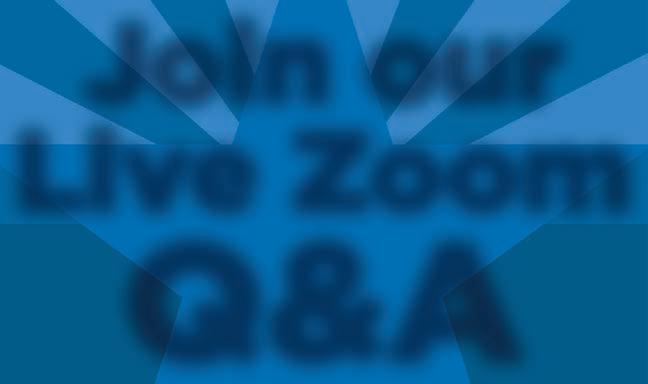TRAVEL PLANS
Locals make plans for the summer



TRAVEL PLANS
Locals make plans for the summer


 WRITER
WRITER
Candice Gimbel has a lot to say about Israel, but she isn’t offering many thoughts on social media or in large gatherings these days.
“Everything I say can and will be used against me,” she said. There was a time when she could talk to her neighbors, her friends and even her brothers about Israel. But not anymore.
“It wasn’t long ago when we would talk about the vibe of the country, and we were talking about Washington. And then the conversation expanded,” she said. “There’s a very cynical assumption that everybody assumes somebody else is biased.”

Gimbel’s struggle reflects a lot of what local Jewish leaders feel when speaking about Israel to their congregations and in other Jewish spaces. For them, too, addressing the topic in a time of intense polarization is tricky.
Rabbi John A. Linder, Temple Solel’s senior rabbi, said he feels like he is walking a tightrope whenever he talks about Israel — that he has to preface whatever he says with an explicit caveat: “Rabbi John Linder, lover of Israel.”
“The tightrope is where I want to listen to Arabs that are being discriminated against,” he said. “Although I am conscious of walking a tightrope, I will not, for the sake of fear of ruffling feathers, remove myself from the arena.”
Temple Beth Sholom of the East Valley Rabbi Herschel “Brodie” Aberson said, he too, is keenly aware of the parameters of what is, and what is not, considered “safe” to say.
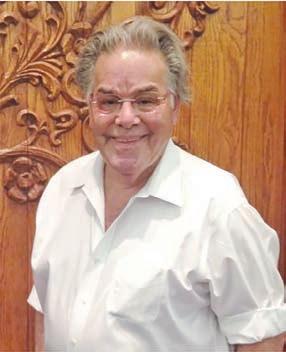
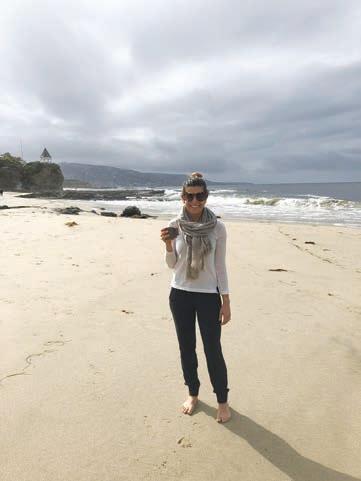
Several synagogues across Greater Phoenix are ready to introduce new clergy to their congregations this summer.

After a year in transition, Congregation Or Tzion will welcome its new spiritual leader, Rabbi Andy Green, in July.

“I’m excited to be joining such a robust and powerful and meaning-seeking community,” said Green.
The most important thing a rabbi can be is “present and listening,” he said, so he plans to spend his early months in Scottsdale getting to know the community and Or Tzion members.
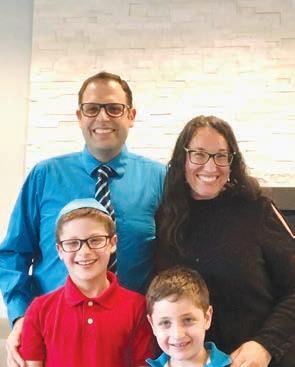
“I love sharing Torah but I also realize that every person connects and relates to Judaism in different ways,” he said. “I’m not interested in imposing myself as much as being in relationship with the members — and future members — of our community.”
As a college freshman, Green became aware of how many Jewish learning opportunities he had compared to his peers and was “somewhat thrust into Jewish communal leadership.” He was president of the Jewish Student Union and later became president of the campus Hillel. But it wasn’t until long after he graduated from UCLA that he realized he wanted to be a rabbi.
“I worked in different contexts — I was in management in an industrial supply company and was involved in public policy and doing different things — but in my heart and in the back of my mind, Judaism
SEE
PAGE 3
SEE ISRAEL, PAGE 2 ISRAEL
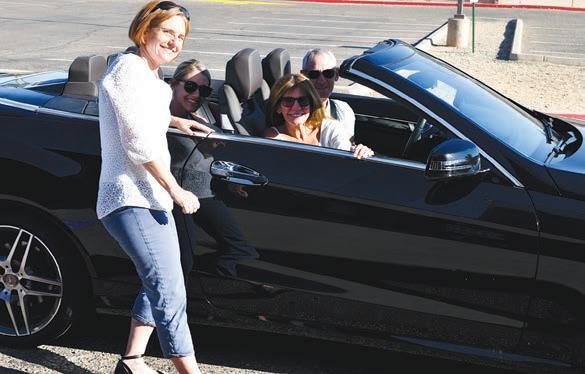
wrong — could be perceived as a betrayal, he said.
“I believe Jews have a right to selfdetermination of their own land. I would never deny that to another people,” he said. “If a rabbi can’t say we need to actually try and cultivate empathy for not just ourselves but the other, then what’s the point of being a community leader? What’s the point of being a spiritual leader?”
Rabbi Dr. Shmuly Yanklowitz, president and dean at Valley Beit Midrash, said the Arizona Jewish community needs more local Jewish leaders willing to talk about Israel in a nuanced way.
The American Jewish relationship to Israel has become almost completely intertwined with American Jewish partisan politics, he said.
“People expect bandwagoning,” he said. “There’s a conservative bandwagoning and there’s a progressive bandwagoning. And if you stray from that, you are in trouble. It is fierce and relentless.”
A recent survey by the Pew Research Center found a growing political divergence of the American-Jewish population. While 71% of Jews are Democrats or lean Democratic, 75% of Orthodox Jews are Republican or lean Republican.
Orthodox Jews are becoming “as solidly Republican as non-Orthodox Jews are solidly Democratic,” the survey found.
Scott Lasensky, former Middle East adviser to the Obama administration, said the American Jewish community as a whole is still broadly supportive of Israel and its decisions around security.
“There’s a strong norm of deference to Israel, of solidarity with Israel. It’s a baseline norm in American Jewish life
for decades,” he said. But that norm has broken down over time.
“I don’t believe it’s solely because of the difference of views in terms of Israeli policies,” he said. “Some of it has to do with polarization here in the United States.”
Jason Greenblatt, former White House Envoy to the Middle East during the Trump administration, did not directly address questions about partisanship, but said “social media, strident activism and cancel culture pose significant challenges to some when it comes to talking about Israel in public spaces.”
Congregation Kehillah Rabbi Bonnie Sharfman talks about Israel in a variety of ways within her congregation:

“I talk about Israel frequently from the bimah and always have, so it’s not a new thing for my congregation to hear about Israel from me; it is challenging to explore serious issues in the limited time allocated for teaching from the bimah during services, so I offer classes to explore in more depth the history and
background of the conflict, considering various perspectives.”
She said that Israel is a “beautiful, joyful, inspiring and sometimes frustrating place and her politics do not map out easily on the American political landscape.”
Sharfman is a Zionist to her core and is “deeply aware” of the role Israel has played in her identify as a Jew. “I am able, with pride, to share Israel’s many accomplishments and to share, with pain (but hope), the areas in which she falls short,” she said. “It is simply honest discussion, akin to a family member who may, at times, fall short of expectations, but yet we still are a family and try to learn from one another and make each other healthier.”
Democratic state Rep. Alma Hernandez (LD-3 ), who describes herself as an unapologetic Zionist, said talking about Israel has never been easy, especially “being a progressive, being a person of color and being in a lot of the circles that sometimes these comments and issues are
January 8
January 22
February 5
February 19
March 5
March 12
March 19
March 26
April 2
April 16
May 7
May 21
June 4
July 9
August 6*
August 20
August 27
September 3
September 10
September 24
October 1
October 15**
November 5
November 19
December 3
December 17
OFFICE HOURS 8 a.m.-5 p.m. Monday-Thursday 8 a.m.-12:30 p.m. Friday
DEADLINES
EDITORIAL: Noon, Tuesday 9 days prior to publication
PUBLISHER Jewish Community Foundation of Greater Phoenix


GENERAL MANAGER Rich Solomon | 602.639.5861 rsolomon@jewishaz.com

MANAGING EDITOR Shannon Levitt | 602.639.5855 slevitt@jewishaz.com
STAFF WRITER Nicole Raz | 602.872.9470 nraz@jewishaz.com
ADVERTISING SALES CONSULTANT Jodi Lipson | 602.639.5866 jlipson@jewishaz.com

SUBSCRIPTIONS 602.870.9470 x 1 subscriptions@jewishaz.com
GRAPHIC DESIGNER Frank Wagner | 410.902.2300 ads_phoenixjn@midatlanticmedia.com
ADVERTISING: 11 a.m., Friday 3 days prior to publication
Jaime Roberts, Publisher | 2013-2016
Florence Newmark Eckstein, Publisher | 1981-2013
Cecil Newmark, Publisher | 1961-1981
Pearl Newmark, Editor | 1961-1981
M.B. Goldman, Jr., Founder | 1948-1961
PROUD MEMBER OF

was always the rhythm by which I lived my life.”
One Friday, he found himself thinking about what the evening would bring. At the time, he ran “an independent Friday evening service potluck” in the condo he shared with a roommate.
“I was humming a melody,” he said. “I was in the warehouse, walking in my steel-toe shoes. And I realized that even though my body was one place, my spirit was somewhere else.” He soon started rabbinical school.
In August 2015, he became the assistant rabbi at Congregation Beth El in Voorhees, New Jersey and then the associate rabbi.
During the pandemic, he and his wife decided they wanted to be closer to family. His parents live in Los Angeles and his in-laws live in Las Vegas.
“That’s one of the things that led us to Congregation Or Tzion. And I have to tell you that just from the first preliminary conversations, it felt like such an amazing fit,” he said.
Being a spiritual leader during the pandemic was hard on many, including Green, but he said he learned some lessons he will bring to Or Tzion.
“We plan for the future, but we never know what it will bring. And it teaches us both to seize this moment and to realize the blessing of today,” he said.
Everybody’s in different spaces, and facing different challenges, both in terms of the pandemic and also just in different phases of life, he said. He hopes to be present for anyone who struggles to find their place and meaning, and to translate the voice and wisdom of biblical ancestors.
Green joins Or Tzion after Rabbi Micah Caplan’s death a year ago. Green didn’t know Caplan personally, but knows his parents, who helped Green prepare for job interviews at the end of his rabbinic studies.
“His parents belong to synagogues that my wife was the youth director at in L.A. And I was in their home doing a mock interview,” Green said. “I’m familiar with his family, and have many, many acquaintances and colleagues who have warm and loving memories and experiences with him, whose lives were so enriched by him.”
Green isn’t the only rabbi filling big shoes.
Rabbi Cookie Lea Olshein starts at Temple Emanuel of Tempe June 1, following the resignation of her friend and classmate, Rabbi Dean Shapiro.
“I’m really excited to create as many relationships as I can, as quickly as I can, as deeply as I can so that I can get to know the congregation and they can get to know me,” she said.
Shapiro announced last October that after a dozen years with the congregation he would be leaving.
“He has been there for 10 years and built the congregation up in many ways that I hope to only build upon,” Olshein said. She is passionate about social justice and interfaith work, and is a Rukin Rabbinic Fellowship with 18Doors, which focuses on empowering interfaith and multi-faith couples.
Olshein’s first move will be to help bring the congregation back together in person in a safe way. She hopes to “create a wonderful feel as people start to re-emerge from COVID,” and remind congregants that Temple Emanuel “is still their home.”
Olshein was a resident rabbinic scholar with Congregation Ner Tamid in the Las Vegas area, where she also led worship and lifecycle events.
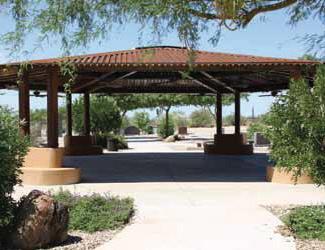
“But I missed the deeper relationships with congregants,” she said.
Before her time in Nevada, she was the rabbi at Temple Israel of West Palm Beach
happiest times of their lives, as well as the darkest.
“Knowing how important those moments of transition are, having experienced some of them myself, having a caring clergy person to walk that path with Jewishly is very important,” Olshein said.
Rabbi James Simon starts in July as Temple Chai’s interim rabbi following the departure of Rabbi Mari Chernow.
“Part of my job is to be a non-anxious presence,” he said. “I am there to help them to literally recommit the future of their congregation.”
Simon was a rabbi for about 40 years before he began working as an interim rabbi. In the past 10 years, he has helped numerous congregations across the country transition after a rabbi’s departure.
Even though every congregation is unique, they have a few things in common, he said.
“There’s always some amount of anxiety about the future,” he said.
He always meets with as many congregants as possible, individually and in small groups, to give them a chance to share their feelings about the changes that are happening.
“I am there actually, to help them to process that grief and to process their worry, and to reassure them that we are going to get through this challenging time,” he said.
During his year as interim rabbi, he’ll be doing “all the rabbinic things” that Chernow did to provide continuity, while working with the search committee to help find a new permanent senior rabbi.
in Florida for eight years, and before that worked as a cantor and associate rabbi in Austin, Texas. But she wasn’t always a rabbi.
She spent 11 years as a civil litigation attorney in Las Vegas.
She was prompted to return to an active Jewish life after both of her parents passed away within four months of each other.

“I found here in Las Vegas the most amazing and enveloping and supportive community that really created space for me to learn and grow and to participate. And 50 people told me I should be a rabbi,” she said.
Initially, she laughed. After all, she was happy being a lawyer. But then she started to look into it and realized she had some transferable skills, like writing, advocating and even preaching.
“Preaching has a lot of similar characteristics to making an argument in front of a judge. I often make a joke that I have much better clients now,” she said.
Her job as a civil litigation attorney was primarily about disputes involving money, and she wasn’t certain that was the path she wanted to follow for life.
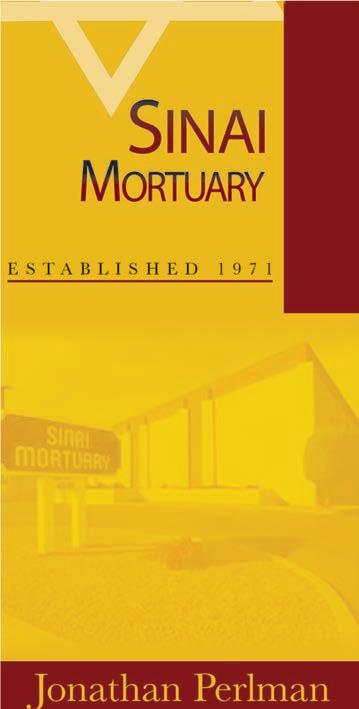
Becoming a rabbi has given her the privilege of working with people in the
Simon said he finds meaning in helping congregations move forward during challenging times.
“I have always enjoyed the people I’ve met, and I’m still in touch with a few of them,” he said.
Rabbi Jeffrey Lipschultz will start at Congregation Beth Emeth July 1.
Lipschultz describes securing his new position as “kismet.”
At the very beginning of his rabbinical career in 2001, he was interested in being Beth Emeth’s rabbi, but was told he wasn’t seasoned enough.
“I had very little experience as a rabbi,” he said. “I said the kaddish too fast.”
But now, “boy, have I been seasoned.” Lipschultz has been the staff rabbi for Madrona Hospice & Palliative Care since 2019. And before that, he was the rabbi of several different congregations around the country. He moved to Arizona from Rock Island, Illinois and then returned to the state in which he grew up in 2019. Beth Emeth will be his fourth congregation.
“I really missed leading a congregation,” he said. “I have a year’s worth of sermons bursting to get out.”
Lipschultz will replace Tracee Rosen, who Lipschultz said has been “very helpful” in the transition. JN
"I'M REALLY EXCITED TO CREATE AS MANY RELATIONSHIPS AS I CAN, AS QUICKLY AS I CAN, AS DEEPLY AS I CAN SO THAT I CAN GET TO KNOW THE CONGREGATION AND THEY CAN GET TO KNOW ME."
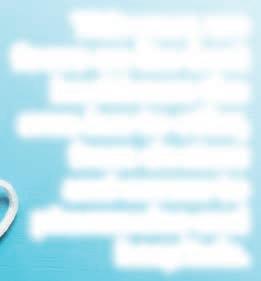


Daniel Stein Kokin was excited to experience firsthand the heavy winds, flash flooding and afternoon and evening thunderstorms, which define the monsoon season, when he moved to Phoenix in the summer of 2019.

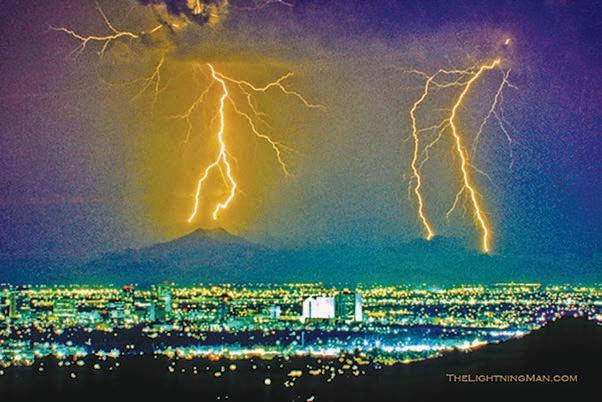
But he’s been disappointed.
“I’ve now spent the better part of two summers in Arizona and they both have featured very meager monsoons,” he said. He wrote a prayer specifically to be read on Shabbat Chukat, June 19, which falls right at the beginning of monsoon season.
“It just so happens that this Torah portion, parshah Chukat, features lots of water-related issues concerning the Israelites who, of course, are at that point wandering in the desert,” Stein Kokin said. “So you have this nice connection of desert and water issues that very much speak to the situation that we experience here in Arizona.”
A Jewish studies scholar, Stein Kokin began writing what he calls “liturgical texts” a few years ago. He is also married to Rabbi Nitzan Stein Kokin of Beth El Congregation.
Writing and experimenting with liturgy

makes him feel “at home” in the Jewish prayer book, and helps him to grapple with his own concerns and feelings — including his concern about climate change and Arizona’s drought.
Marvin Percha, a meteorologist for the National Weather Service in Phoenix, said he understands Stein Kokin’s concern and disappointment over the recent lackluster monsoon seasons.
“Most of the state is in extreme drought right now,” he said. “Without those summer rains, it definitely leads to drier conditions and higher fire danger levels.” Rain also brings clouds, which help to temper the summer heat.

Stein Kokin “definitely saw a real dud” of a monsoon season last year, Percha said. Last summer was the hottest and driest on record in Arizona.
Conversely, the wettest monsoon season on record was 1984, with more than 9 inches of rain, and the last “good one,” Percha said, was in 2018, which saw rainfall near an average of 2.7 inches.

There is not a consensus in the scientific







community whether monsoon season variation is responding to climate change. There is also a lot of natural variation with the southwest monsoon, since it depends on larger wind patterns.
During late spring and early summer, the wind direction in Arizona is from west to east, but during the monsoon the wind direction changes from east to southeast, bringing tropical moisture from the Gulf of Mexico and from the Tropical Eastern Pacific.
The odds are tilted toward a wetter than normal monsoon season this year, Percha said.
Stein Kokin moved to Phoenix from Los Angeles, where he grew up. He identifies as a “weather buff” and said he’s been fascinated by weather since he was a kid. When he first learned about the greenhouse effect in third grade, he was so traumatized he had a nightmare about it, he said. “My head is literally in the clouds, because I’m often looking up at the clouds.”
He based his “Prayer for the Southwest Monsoon” loosely on Tefillat ha-Geshem (prayer for rain) and other traditional texts. The opening verse is as follows:
“Today we do not thirst:

Canal and pipe flow forever full, in morning sun sparkle backyard pools.
But from no cistern can the cactus sip, for Ponderosa Pine no faucet drips, As drought has dried soil and spring, and flora and fauna pine for drink.
And as we behold the parched landscape, can we not but meditate and think:

That our desires and demands have brought us to the brink?”
Stein Kokin will share and discuss his prayer during a virtual Valley Beit Midrash presentation June 17, and will recite it again at Beth El Congregation on June 19th. JN



As Rabbi Tracee Rosen was unloading boxes after arriving in Arizona in 2010, her new neighbor informed her that a local Reform congregation, Temple Gan Elohim, was looking for a rabbi. She and her family had relocated to Greater Phoenix to be closer to her mother-in-law, moving from Salt Lake City, where she served for six years as the rabbi of Utah’s largest synagogue.
Her family attended Shabbat services there that Friday night and soon after, Rosen accepted an offer to become the congregation’s spiritual leader, a role she continued until the congregation closed in 2016.
When it closed, Gan Elohim was housed at Beth Emeth Congregation, a Conservative congregation in the West Valley, and Rosen was also leading Saturday morning services for Beth Emeth members. By the next year, she was Beth Emeth’s spiritual leader. Now, after a year of leading the congregation through a pandemic, she has announced that she plans to retire from the pulpit.
“This year of seclusion has given us all a lot of time to think about our priorities,” she said. “I looked at how my time was being spent and what I had energy for and what I didn’t have energy for.”
She plans to refocus on her family as well as continue teaching. Now that she’s grown comfortable with online teaching, she’d like to increase her online presence and has also “threatened to write a book” based on one of her classes, “Hidden Secrets of the Ten Commandments.”


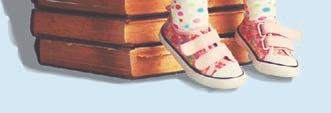
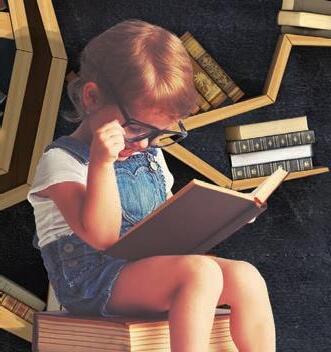


She was also recently appointed to serve on the Rabbinical Assembly Committee on Jewish Law and Standards, which sets the halachic policy for the Conservative movement.
During her past decade or so in Greater Phoenix, Rosen served two years as the director of a Phoenix-based Florence Melton School of Adult Jewish Studies program, was active in the Phoenix Board of Rabbis, taught Jewish studies and Hebrew classes at Pardes Jewish Day School in Scottsdale for six years and taught classes for the Women’s Jewish Learning Center in Scottsdale.
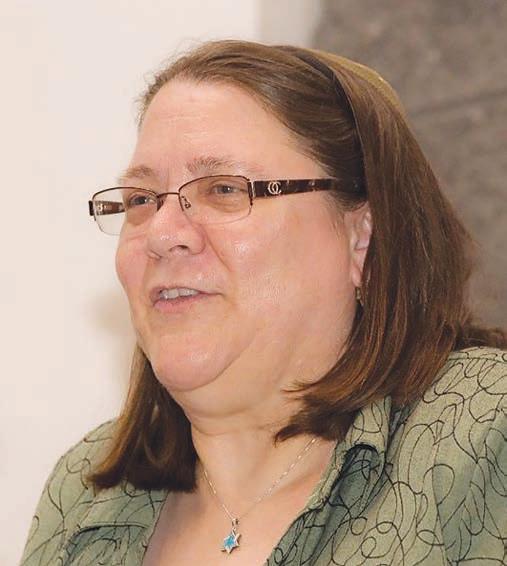
Teaching adults was what she originally envisioned doing when she enrolled in rabbinical school at the University of Judaism (now American Jewish

University) at age 35, after a career in banking. She earned her smicha in 2000 from the Ziegler School of Rabbinic Studies, a Conservative seminary, and after completing a three-year apprenticeship at Valley Beth Shalom in Encino, California, she became the rabbi of Salt Lake City’s Congregation Kol Ami.
That congregation was a result of a merger between a Reform synagogue and a Conservative synagogue so she needed to serve members from both backgrounds and levels of observances.




Rosen and her wife, who have one child, plan to remain in Greater Phoenix and she plans to continue her work teaching classes for the Women’s Jewish Learning Center and serving on the grants committee for the Jewish Community Foundation of Greater Phoenix, as well as continue her work as a hospital chaplain for Jewish Family & Children’s Service.
“One of the things that I love about this community is the friendship and collegiality among the rabbis in this community,” she said. “That’s been a source of great strength and support that we’ve been able to offer each other this past year and all the previous years.”
Rosen said one of the things she enjoyed most as a pulpit rabbi was the relationships she had with people through the years.
“It’s such an amazing honor to be invited into people’s lives” during these important lifecycle events such as births, b’nai mitzvah, weddings and funerals, and “being able to share that with people.” JN

Morgan Singer wasn’t planning to be a stay-at-home mom.
She lost her job as an executive assistant on her last day of maternity leave early last year — and then the pandemic happened.
Singer was looking for a way to make some income and sought out BabyQuip, a company that cleans and rents baby gear for families on the go. The company has independent quality providers that deliver and set up insured baby equipment to private residences, vacation rentals, hotels and airports.
“I had heard of them because they were on ‘Shark Tank’ a couple years ago. And then a local influencer that I follow on Instagram, @whatlolalikes, talked about its services when she was going on vacation. So I thought I would look into it,” she said. “And I was interested in renting gear myself last summer.”
She joined the company in October 2020 as a provider in Gilbert, where she lives with her husband, 18-month-old daughter and two stepsons. They have another baby due in September. As far as she knows, she is the only local BabyQuip provider who is Jewish.
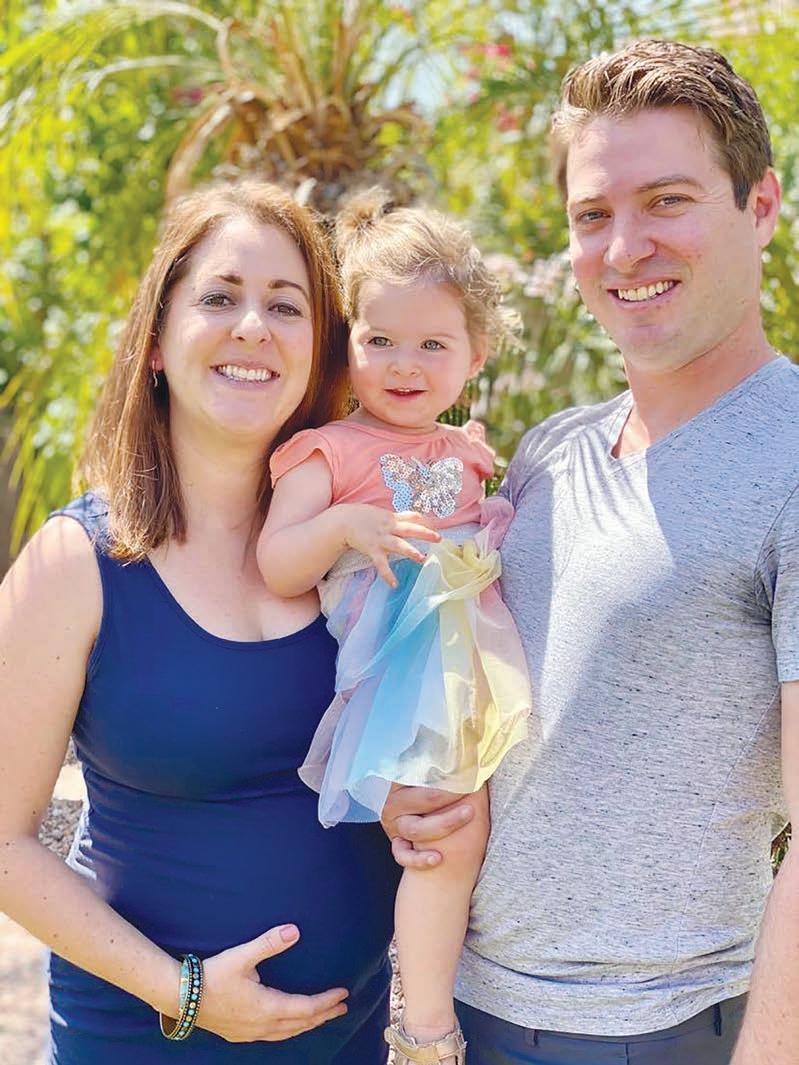
Singer grew up a member of Temple Chai and will send her daughter this fall to the East Valley Jewish Community Center. “Judaism is important to me and raising my children in a Jewish home,” she said. She hopes to connect with Jewish customers as well.
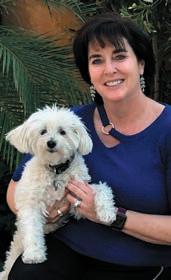
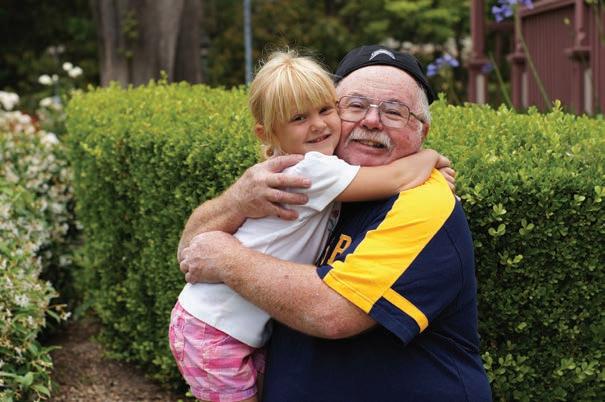
Preparing for a busy travel season — Phoenix Aviation Department reported a 1,023.2% jump in airline passenger volume at Sky Harbor in April, compared to the same time last year — Singer spoke to Jewish News about her business,
interacting with customers and the challenges of traveling with babies.
How does the need for baby gear complicate travel?
When my daughter was 3 months old, that was the first and only time we went on a plane — right before everything got shut down. And it was super easy to travel with her. I didn’t bring a stroller; I didn’t bring a car seat or a crib because my sister had all of those things. But had that not been the case, it would have been incredibly stressful to bring all of those things by myself — because my husband wasn’t coming with me — and then worry about transportation and fitting luggage and everything like that.
We went on a couple of road trips as well over the past year. And we kind of had to pick and choose what we could bring, and even then our whole car was filled with items for my daughter.
What has business been like?
When I joined the company, they only could bring me onto the cleaning side — due to COVID, no one was traveling at the time. Parents just don’t have time to clean car seats that get really yucky and gross, and when you have another little one on the way and you want to reuse your gear or even resell it, it’s just a great service to have.
I was able to join the rental side of the business in March. And business has been very busy because people are traveling again. I started to get orders right away. I don’t know what the summer will be like in Arizona. Since it is hot here I’m not sure how often people are going to be traveling. But I do feel like people have
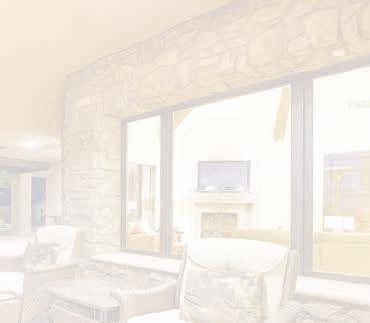
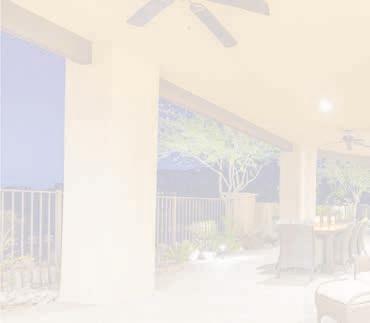
this is my first time being a business owner, I think it’s such a great place to start because they provide so much information and resources, you’re really not on your own. There’s a lot of people in the community you can connect with, and you can work with other local providers if you want to. But I’m learning the value of continuing to put the work in and following up with customers and providing excellent customer service.



Do you have prior customer service

I have years of experience doing customer service. I’ve done so many different things and I started off in customer service after college. Customer service has always sort of been a part of all the different roles that I’ve had, whether it’s when I’ve worked in HR, recruitment, compliance and then
What has stuck with you so far from your I love BabyQuip because it brings people together. I love seeing grandparents’ faces when they are so happy at the ease of obtaining gear for their grandkids they have not seen in over a year. I love making travel and visits easy for everyone and keeping families together, creating memories and celebrating holidays. JN
To rent equipment from Morgan Singer, visit tinyurl.com/4rhdnjyb.
Wednesday, June 23rd
Musical Instrument Museum Tour 2:00pm - 4:00pm, followed by happy hour at LivGenerations Mayo Blvd Showroom 4:30pm - 6:00pm
Musical Instrument Museum: 4725 E. Mayo Blvd | Phoenix, AZ 85050
LivGenerations Mayo Blvd Showroom: (intheScottsdale101ShoppingPlaza)



7000 E. Mayo Blvd, Suite 1108 | Phoenix, AZ 85054
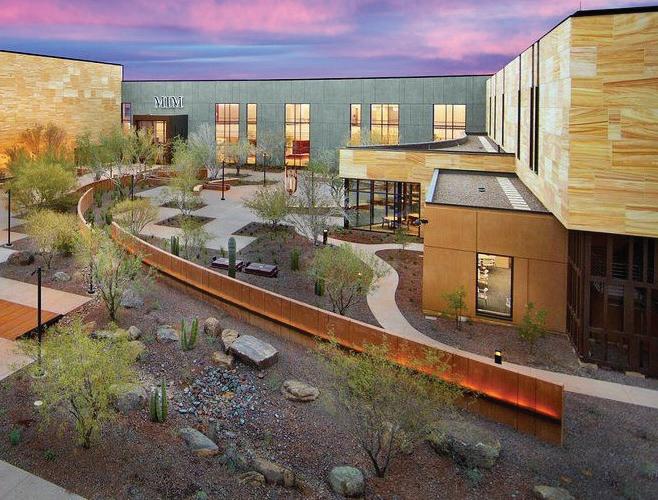
RSVP to Nicole or Alfred at 480-485-5000
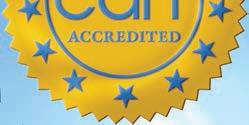
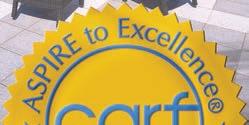
Susan Finks had such a great family vacation during the COVID-19 pandemic that she’s planning another one for this month.
“We’re going to take a virtual Caribbean cruise,” she said. The family will board a virtual ship in early June from either Florida or Louisiana. How does one take a virtual cruise? By watching Caribbean-themed movies and eating cruise-themed food, she explained.
“They’re really good sports,” Finks said of her 19- and 22-year-old sons. “I’m surprised that they were on board about it last year, as well as this year.”
Finks and her family aren’t ready for an in-person vacation yet. “We have some logistical issues,” and, besides, she isn’t “itching” to get away.
Some of those who are ready to plunge back into travel are already preparing for big adventures in coming months.
For Doran Arik Miller, the hardest thing about the pandemic was not being able to travel.
“I recognize I’m fairly privileged to be able to say that,” she said. “I really crave those opportunities to get out of my normal routine of school drop off, work and making dinner. It’s fun to just do something new and different.”
Before COVID, she and her family traveled “a lot” as a family, but sometimes traveling was a way to have time to herself, too.
“I think in 2019 I was somewhere every month — and it was great and I loved it,” she said. “I was definitely not one of the people who found that during COVID it was really nice to slow down.”
The pandemic canceled her family’s plans to spend a month in Israel last summer.
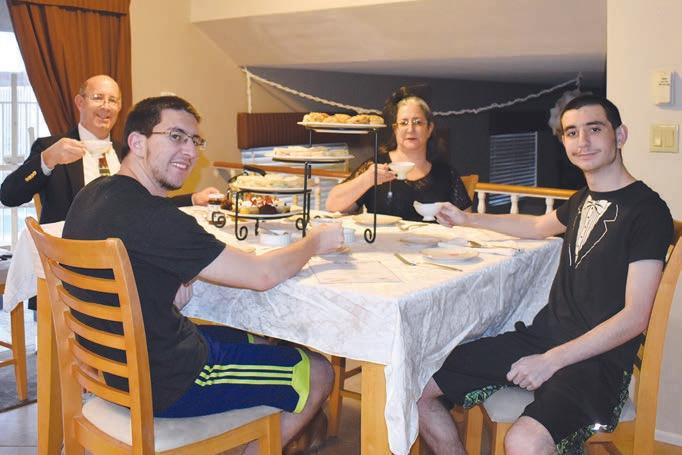
“I was really excited about introducing my child to this big piece of my family history,” she said. Instead, Miller and her family drove to California for a week to escape the desert heat.
“We had to get out of the heat; we had to get out of the house. We’ve been home for so long, and we just felt like we needed to go somewhere else,” she said.
While there’s a chance she’ll be going to Israel this summer, “it is not going to be the family trip that I thought it was going to be.”
At this point, the pandemic is still thwarting Miller’s summer planning, which leaves her summer travel agenda murky.
Miller is on the Jewish National Fund Desert States board of directors and is hoping to chair a trip for emerging leaders. “I’m hopeful that happens,” she said. “It was supposed to be the beginning of July; we’ve pushed the date back as we’re awaiting further guidance from Israel and

the ministry of tourism.”
If that doesn’t work out, they will likely again head to California.
She’s doing her best to be flexible, but she can’t help but think of it in terms of the numbers of summers lost before her son goes to sleep-away camp.
“My hope is that soon, we’ll be able to start enjoying travel and all of the benefits of travel. I think it’s great for adults, it’s great for kids,” she said.
Meanwhile, Madelyn Shulman is definitely going to Israel this summer with her husband Jim Stevenson. The couple were married last October.
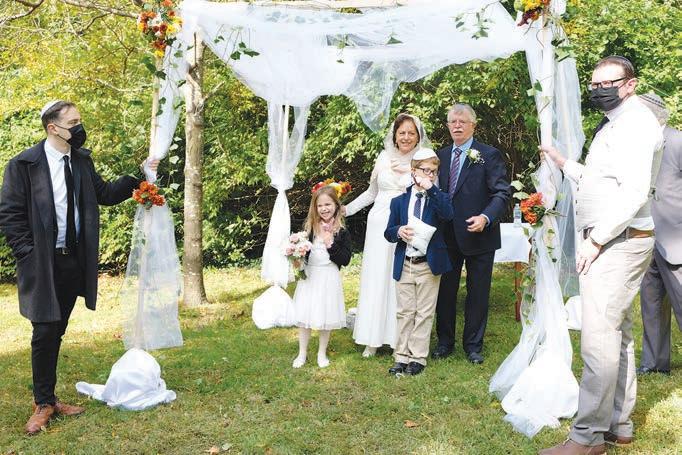
“As soon as we heard about the vaccine rollout in Israel and how extensive it was, I said, ‘Oh, that’s where we should go,’” she said. “If you’re going to book something you should book something where you’re pretty sure things will be open.”
Shulman has been to Israel a number of times, but her last visit was 20 years ago. It will be Stevenson’s first time there.
“It’ll be fun going with someone who’s never been,” she said.
Before COVID, Shulman would go on one big trip every year. She’s been to Hong Kong, Italy, China — “I want to go everywhere,” she said.
She’s needed a vacation for a long time, she said.
“But it’s not a question of do I need a vacation — it’s that I’m at a point in my life where travel is important.”
Shulman is a fan of group tours, and will be going to Israel with Gate 1 Travel.
Finks, on the other hand, imagined a travel company for her family’s virtual trip to New York and England. She made up mock boarding passes, movie and show tickets.
That virtual travel stemmed from the cancellation of her son’s high school graduation trip. She made themed dinners, ranging from a mock hot dog cart in the front yard to high tea, and watched movies related to each locale including, ”Hamilton,” “Spider-Man: Into the Spider-Verse” and “Monty Python and the Holy Grail.” For the days they would have been traveling, they watched airplane-themed movies like “Top Gun” and “The Terminal.”
“I asked my oldest son one day, ‘Why are you going along with this?’ And he said, ‘You’re cooking and we’re having family night. What’s not to like?’” she said.
Her youngest son appreciated her efforts to do something in honor of his graduation, she said, even something pretty original. He was most interested in seeing New York’s Broadway shows, so once Broadway is back in full force they will take an in-person do-over trip. JN



Eden Levi doesn’t think of herself as a writer, and she’s not planning to make it a career. But in April, the 17-year-old junior at Shearim Torah High School for Girls published a book and is selling it on Amazon.


“Spiritual Sunshine” is about emunah (faith) — from a teen’s perspective. The topic is big, complicated and seemed to Levi to be exclusively the province of adults. She searched nearly in vain for something written by a young person, finding only one small volume. She suspected she could write something that would be of value to other teens who harbored similar questions.
Since the book’s release, she’s been receiving emails from teens asking for advice and she was even invited to speak at a high school in Chicago. But she doesn’t claim to be an expert — just someone on a journey who wants to learn all she can and share it.
Levi is interested in poetry, art and music and plays piano, guitar and even a bit of the Native American flute. “I just like crazy creativity and self-expression — and the outdoors,” she said.
She also loves taekwondo and has a third-degree black belt. She has been training with her mother since she was 2 years old.

But writing? In general, she’s not that interested.
“It was more that I wanted to write about this topic, so I did. It wasn’t that I was coming from a place of loving writing,” she said.
Levi’s mother encouraged her to write the book after listening to her daughter opine on the topic for some time. Levi demurred, thinking she couldn’t do it. Still, a year later she completed her first book. Using the Fiverr app, she was able to get assistance designing, printing and binding an actual book — complete with cover art — giving her a product she could sell on Amazon.
Three sections make up the structure of the book. The first is focused on defining various aspects and levels of emunah. A section on various ways to apply faith to one’s life follows. The third section, Levi’s favorite, is filled with faith-filled poetry and stories. “It’s just like a fun game, a chill and visually fun vibe that also poses challenges,” she said.
“But it’s straight-up fun.”
She took months researching the topic, reading widely and asking teachers and rabbis for help in defining terms and getting some historical perspective. She asked these experts to read her words to ensure she was presenting things accurately, and she got some feedback from fellow teens to ensure the book is readable and fun.
Rabbi Raphael Landesman, head of school at Shearim, has read a large part of the book and thinks it’s good.
Levi is someone who feels strongly about sharing things that are important, he said, and struggling with one’s understanding of faith and belief matters to her.
“She wanted to make it accessible for teens who might view it as a heavy thing, but she knows it’s an important and blessed part of one’s life,” he said.
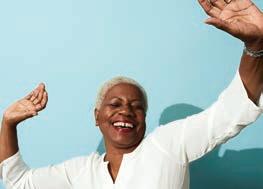

While the book delves into deep issues, she keeps her language light, accessible and filled with lots of LOLs and slang. She also offers her readers encouragement along the way: “Dude, you are literally doing fantastic so far. I am just so pumped that you actually are reading

right now. I’m not kidding.”
Landesman acknowledged that Levi’s light tone and use of slang lend the book a unique angle when talking about a serious subject, but that doesn’t lessen its impact. He looks forward to hearing how kids who read it are inspired and able to gain a new understanding of faith.


“She’s very open about herself and her struggles and what she’s dealt with and that adds to the light and to the accessible feeling,” he said.
Chana Weisman, 16 and a junior

Connection is key to a longer & more vibrant life, and powers everything WE do. It’s like being part of a super supportive family of waiters, chefs, housekeepers, ZEST® activity coaches, care & wellness teams, and even a bunch of really friendly & fun neighbors, all helping you thrive. It’s all here at Maravilla Scottsdale senior living community. Experience the Power of WE.
Thursday, June 17th • 10:30am
Join us for an informative presentation on senior living and the exceptional services & safeguards o ered. Afterwards, take a tour of our beautiful community and enjoy a lovely brunch, expertly prepared by our culinary team. Seating is limited & socially distanced. To make a reservation, call 480.269.1952.
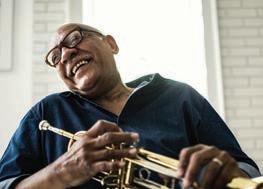
FAWZYA KHOSTI, AN EXECUTIVE FUNCTION COACH, AND RADIO SHOW HOST OF FOCUS ON SUCCESS IS HOSTING THIS FREE ONLINE SUMMIT FOCUS ON SUCCESS IS BROADCAST LIVE EVERY WEDNESDAY AT 9 AM PACIFIC TIME ON THE VOICEAMERICA EMPOWERMENT CHANNEL. WWW.VOICEAMERICA.COM/SHOW/4000/FOCUS-ON-SUCCESS


MONDAY, JUNE 7, 2021
4:00PM-5:00PM FAWZYA KHOSTI
How Executive Function Manifests in Everyday Life and Tips to Help Your Child Succeed.
5:00PM-6:00PM DR. SARAH BALD
Recognizing Common Mental Health Issues. Does Your Child need Therapy?

TUESDAY, JUNE 8, 2021
4:00PM-5:00PM CLARISSA ABIJAOUDE AND JESSICA KASTEN Nurturing Diverse Learners Throughout Their Educational Journey.

5:00PM-6:00PM DR. BRETT ANDERSEN Navigating the Public Educational System.



WEDNESDAY, JUNE 9, 2021


Tucked between a dance school and a 60’s retro lounge on a quiet street in Tucson, sits a small Middle Eastern and African foods store. But Al Basha Grocery isn’t just a place to get kosher meats and hard-to-find ingredients.

“It provides an opportunity for people to see each other as real people, and have a normal interaction with people who ordinarily might not interact in their dayto-day lives,” said Jesse Davis, a regular Al Basha shopper.
Ghufran Almusawi and her husband Anas Elazrag, both Muslims, opened Al Basha in July 2019 with the intention of creating a “melting pot,” Almusawi said.
“Serving kosher in our store was one of the ways that we can bring the communities together,” she said. “We just want to offer services to everybody; we want to make everybody feel welcome.”
REGISTER AT EXECUTIVEFUNCTIONCOACHAZ.COM

And she regularly witnesses dialogue between the Muslim and Jewish customers who come in.
“I see a lot of customers interacting with each other, especially if they have questions,” she said. “Sometimes the customers will jump in and answer as a way of them showing, ‘Hey, we accept you, you’re welcome here.’”
Al Basha caught Davis’ eye before it even opened, with its big sign advertising halal and kosher foods.
“A halal, kosher store — somebody who’s actually trying to reach out to both markets and both communities? That’s pretty striking,” he said. “They were definitely reaching out a hand.”
Davis appreciated the gesture and has been shopping at Al Basha about three times a month since it opened.
“They’re super friendly and helpful,” he said. He’ll often get recommendations on products and spices to use in recipes.
Davis’ favorite thing to buy at Al Basha is pomegranate molasses, which he described as “a sort of finisher” for meat, giving it a “sweet, tangy flavor.”
Evelyn Sigafus looks forward to Al Basha’s tea selection when she goes a few times a year for kosher deli meats and holiday food ingredients.
Sigafus appreciates the store’s efforts both to meet the need for kosher foods and to foster dialogue and relationships between the Jewish and Muslim communities.
“One time I was in there and the woman there did not have other customers, so we had a wonderful conversation about kosher products, keeping kosher, halal, what I personally do, and how I cope and how she copes, and we had a wonderful little chitchat time,” Sigafus said.
Sigafus said that kind of person-toperson conversation is beneficial, no matter how much exposure somebody has already had to different cultures.

Elazrag, a doctor, came to Tucson in 2008 from Sudan. He decided to open Al Basha after he had a poor shopping experience, Almusawi said.
Her husband wasn’t convinced existing local markets had what people really needed or that they could make all customers feel comfortable.
Almusawi, an Iraqi-American, grew up in Michigan and was already familiar with the grocery business.
“My dad was in the grocery world and he was always so happy to see his customers and was welcoming. He didn’t really look at a customer as being somebody other than a human that he’s providing a service for. He didn’t look at race, color, religion, none of that. And I kind of grew up following that. And fortunately, my husband’s the same way.”
Almusawi said she’s seen fewer Jewish customers since the recent violence between Hamas and Israel.
“I just don’t think they feel comfortable coming in,” she said. “I’ve had people come in and say, ‘How could you do this? How could you sell this right now? And I’m just like, ‘OK, this company (kosher food supplier) in California has nothing to do with it, we’re just one business supporting another.’”
The pushback comes from both worlds — some Muslims don’t want to support the store because it supports the Jewish community, and some Jews don’t want to support the store because it is owned by Muslims.
She tries to focus on the positive
responses and those showing support for unity.
“What both religions teach is peace,” Almusawi said. “We’re welcoming of everybody. We don’t want to make anybody feel uncomfortable and anybody is welcome to shop. And if there are any items that are missing that they are looking for, we’re always willing to bring it in.”
Al Basha is in Yisrael Bernstein’s regular shopping rotation. He usually makes an “east side loop” on Fridays gathering food for several Chabad rabbis. He stops at Al Basha, Trader Joe’s and then Costco. It can take up to six hours, depending on who joins him.
He discovered Al Basha a couple of years ago “on a lark,” figuring that if they sold halal food they might also have kosher items, “and sure enough, they did.”
He got to be very friendly with Almusawi and she began making sure the store carried his favorites: corned beef, pastrami and hot dogs. With his long beard, his black hat and his long coat, he always feels welcome.
“I really do. It makes my whole Shabbat weekend,” Bernstein said.

Al Basha is “not going to save the world,” said Davis, but it’s those little bridge-building exchanges that can.

“We can’t just reduce each other to what we see on television,” he said. “For all the differences that we might have, maybe we just have more in common. And you get a chance to see that in a really human context — you’re shopping for what you’re going to put on your family’s table.” JN
Almusawi and Elazrag opened their second location, Al Basha Market, last month at 3421 N 1st Ave in Tucson.
George Kalman survived the Holocaust and spent the last years of his life working to ensure Arizona’s public schools are required to educate children about it.
A bill mandating just that idea failed to pass last year, and its prospects remain uncertain as the state legislature’s session comes to an end — and as this newspaper goes to print — in part, because defining antisemitism is not clear-cut.
“I would like to have some definition, because otherwise we don’t know what we are talking about,” Kalman told Jewish News last month. “It’s very hard to explain.”
Agreeing on a definition of antisemitism — and how to use it — is messy. It’s a debate that has touched college campuses and state legislatures across the country, including in Arizona, where Kalman, 86, passed away on May 25.
What is IHRA?
The International Holocaust Remembrance Alliance, or IHRA (pronounced “Ira”) created a definition of antisemitism in 2016: “A certain perception of Jews, which may be expressed as hatred toward Jews. Rhetorical and physical manifestations of antisemitism are directed toward Jewish or non-Jewish individuals and/or their property, toward Jewish community institutions and religious facilities.”
That definition is accompanied by 11 examples intent on making it more accessible, especially when it comes to explaining anti-Israel speech.
Two examples are: “denying the Jewish people their right to self-determination, e.g., by claiming that the existence of a State of Israel is a racist endeavor,” and “applying double standards by requiring of it a behavior not expected or demanded of any other democratic nation.”
Controversial applications
IHRA’s definition is almost identical to one drafted in 2004 for the European Monitoring Centre on Racism and Xenophobia. Antisemitism expert Kenneth Stern helped to draft that definition, which was “created primarily so that European data collectors could know what to include and exclude. That way antisemitism could be monitored better over time and across borders.”
And it has now been adopted by dozens of countries, including the United States, as well as private and public institutions.
What endorsing or adopting the definition actually means, however, varies from helping Jews feel supported to using it as a tool “for hunting speech,” Stern said.
Beginning in 2010, some American Jewish organizations began a push to use the IHRA definition to counter certain speech on college campuses, including Boycott, Divestment and Sanctions against Israel campaigns.
The definition, Stern said, was never intended to be used as a campus hate speech code. Expressing pro-BDS sentiments, while troubling, is not necessarily anti-Semitic under the IHRA definition, he said.
According to the American Jewish Committee, 28 student governments of colleges and universities have passed legislation endorsing the definition.
“In most, if not all cases, the adoption is tied to BDS issues,” said Richard Hirschhaut, Los Angeles Director of the AJC.
That’s what happened at Arizona State University when the student government passed a resolution in September 2020 that condemned antisemitism and called for institutional representation for Jewish students. It also recommended the university administration adopt the IHRA definition as ASU’s official definition of antisemitism.
“Every year there comes a time where a resolution comes up, namely the BDS movement resolution, that just seeks to exclude students on campus,” said Cameron Decker, who finished a twoyear term as student senator in May. He and a coalition of other students wanted to pass a resolution to show support for Jewish students.
There wasn’t debate or discussion about the IHRA language in the student senate, he said. A Jewish student had authored the majority of the resolution with the input of other Jewish students and leaders on campus, and “we were all in agreement,” said Decker, who is not Jewish.
ASU’s administration has not adopted the language, however. That is in line with most universities as “only a handful of university administrations have acted on student legislation,” said Mark Rotenberg, vice president of university initiatives and legal affairs for Hillel International.
Some students with University of Arizona Hillel were working on a draft
resolution to adopt the IHRA definition earlier this year to share with the student government. But the effort tapered off.
“The reality with the pandemic is that it just became hard to communicate with people, and more importantly, people communicating back,” said Michelle Blumenberg, outgoing executive director of the university’s Hillel Foundation. “I think that will be on the agenda in the fall, perhaps.”
The state’s government is also running into hiccups with IHRA. A proposed amendment adding the definition to Arizona’s long-awaited Holocaust education bill has stalled the legislation.
Last year, a Senate bill would have adopted the IHRA definition as well as added new antisemitism language to the criminal code. When the bill didn’t pass both chambers, a couple of legislators pushed to amend the Holocaust education bill. The amendment would have codified the IHRA definition into Arizona law, directing state officials to consider the definition when investigating and tracking crime and discrimination.
“They were trying to modify the criminal statute,” said Michael Beller, co-founder of Arizona Teaching the Holocaust, an initiative founded with the purpose of passing a bill in the state legislature to mandate Holocaust education in Arizona.
The pandemic stopped the legislation, and when Rep. Alma Hernandez (LD-3 ) reintroduced the Holocaust education bill this year, the IHRA definition was not included.
However, some lawmakers are reportedly pushing against a vote on the bill until language is added to the Holocaust education bill, or another one, mandating the State Board of Education require instruction about the Holocaust and its causes, including the IHRA definition of antisemitism.
Kalman told Jewish News he was not familiar with the IHRA definition and did not find it helpful. “Searching the web about the IHRA definition did not help me,” Kalman said. “What I found were examples, explanations and double talk: ‘certain perception,’
and ‘may be expressed’ to me is not a definition. If a student asks me about IHRA, I will tell them that I do not understand what it says.”
Earlier in the legislative session, Republican Sen. Paul Boyer (LD-20) was trying to amend the Holocaust education bill with the same language. Beller said adding an amendment to Holocaust education, which also includes teaching about other genocides, threatens assurances made to the interfaith coalition built to ensure the bill’s broad support.
“The second that you make it about a specific religious group, then other groups want that representation as well,” he said.
The controversy over IHRA looks different on the national stage. In October 2020, Politico first reported the U.S. Department of State was planning to label three global human rights groups — Amnesty International, Human Rights Watch, and Oxfam — as antisemitic under the auspices of the IHRA definition of antisemitism. The plan was to declare that it is U.S. policy not to support such groups, including financially, and urge other governments to cease their support.
That didn’t end up happening. A State Department spokesperson did not tell Jewish News what stalled those plans, but said the Biden-Harris Administration categorically condemns antisemitism and is not considering designations of organizations as being antisemitic.
Bills have also been introduced in Congress seeking to codify the IHRA definition into U.S. law, further prompting debate on the national stage as Jewish groups choose whether to support those efforts and/or to endorse them.
The AJC and Hillel International are among the 51 members of the Conference of Presidents of Major American Jewish Organization that have endorsed the definition.
“It provides a common lexicon and vocabulary for understanding antisemitism, for recognizing antisemitism, and where Jew-hatred fits
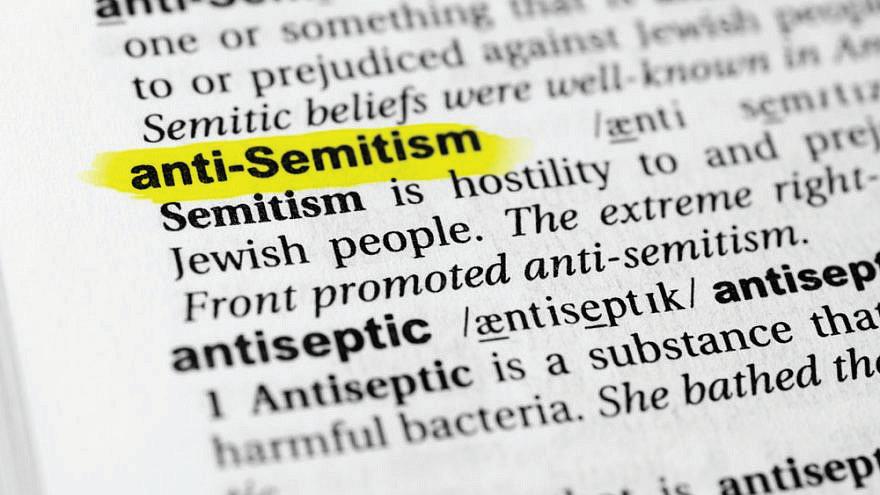
HEADLINES
ISRAEL CONTINUED FROM PAGE 2
not welcomed in.”
But, just because talking about Israel isn’t easy doesn’t mean those conversations shouldn’t happen.
“I know people are a little scared to say things,” she said. “ Every time I post something I have many people reach out to me privately saying, ‘I agree with you. Thank you so much for doing that. Thank you for standing up and using your voice.’ And my response is always, ‘Great, but I also can’t be the only one.’”
There are increasingly pluralistic attitudes about Israel and what defines a legitimate Israeli defense versus a provocation. Overall, younger American Jews are less attached to Israel than older generations, according to Pew. About half of Jewish adults under 30 describe themselves as emotionally connected to Israel, compared with about
BOOK
CONTINUED FROM PAGE 9
at Shearim, was wowed by the book. Levi makes a difficult topic easy to understand for teens, she said. “I thought it was amazing.”
Weisman doesn’t have a favorite chapter, but she especially appreciates the exercises Levi included. Listing what one is grateful for or identifying a difficult circumstance and then attempting to find the good in it makes the idea of faith “more than just a nice thought,” she said. Exercises like these encourage the reader to apply what they’ve just learned, which make the lessons stick.
Teens get overlooked when it comes to complex issues, Weisman said, but they have needs and will be able to identify with Levi’s struggles.
IHRA
CONTINUED FROM PAGE 11
in the larger scheme of hate and bigotry,” Hirschhaut said, but noted the AJC does not have a desire to see the definition codified into law.
Rotenberg agreed the definition provides a useful framework for understanding antisemitism in today’s world.
“Many people hear the word antisemitism, they imagine Nazis, and they imagine Hitler, and they imagine concentration camps, but they’re less able to appreciate the many different faces of antisemitism in 2021,” he said. But Hillel is not insisting or campaigning to have every university in America adopt the IHRA definition, he noted. “Each university needs to examine its campus
two-thirds of Jews over age 64.
Yanklowitz said the old ways about thinking about Israel and framing a dialogue about Israel don’t work anymore.
“We’re going to have to get to critical
among Israel’s various populations.
Hernandez said everybody is entitled to their own opinions.
“But, at the end of the day, what’s important is that we all support each
Gimbel has been a member of several area synagogues. She feels knowing the ins and outs of Israel is definitely part of a rabbi’s job description, because Israel is a “very essential part of our identity.”
But Aberson noted he didn’t learn a great deal about Israel outside of a biblical context during rabbinical school.
thinking about a next model, beyond the models we’ve been engaging in,” he said. “Part of the assumption in the new model is going to have to be, there is no security for anyone without successful coexistence”
other as a community. That we see each other as humans, and see each other as members of the Jewish community, regardless of what our beliefs are.”
Where those conversations should happen is up for debate as well.
“I don’t know a lot of rabbinical schools that have extensive programs in the history of Israel or the IsraeliPalestinian conflict,” he said. “It’s an interesting aspect that we would assume a religious leader in the United States would have to speak out about what is essentially a social political conflict in another part of the world.”
There’s an assumption from the outset, that everybody, as a Jew, has some long history with Israel, he said. But that isn’t a given. JN
“I think once people hear about the book, people will buy it — and they should,” she said. “If you ever met Eden you would buy it just because she’s so amazing.”
book is just one step to do that.
“I want teenagers to be able to take what I learned that really helped me — I want to share that,” she said.
As far as writing a second book,
just not as a full-time job.”
She’s OK not knowing what she’ll do after college. She wants to help people so she thinks maybe something in a healing profession. Her musical aptitude might lead her to be a professional musician. She knows that she doesn’t need to decide that now. And in the meantime, “I don’t need to wait until I’m older to start helping people,” she said.
That’s what she feels she’s doing already with her book by letting kids know faith is for everyone:
Levi praised her teachers and advisers as “awesome people who have taught me everything,” she said. She feels blessed and wants others to have the same learning opportunities she’s had. The
she’s open to the idea, “because I’m going to keep learning,” she said. “And how I see things will change and I’ll have different perspectives, so I probably will write another book —
“Just remember that emunah is just as much for the cool as it is for the uncool. Emunah is just as much for the trendy as it is for the nerdy.” JN
The book is available on amazon.com.
climate and figure out what steps are necessary to address antisemitism on their campus.”
But other groups, including Americans for Peace Now, the Workers Circle, J Street, the New Israel Fund and T’ruah, have spoken out against IHRA’s definition and its potentially overlybroad applications.
“IHRA should not be adopted and enacted as policy on the federal level or any other level,” said Hadar Susskind, president and CEO of APN. He fears it will “shut down any criticism of Israeli policy” by immediately equating that with antisemitism.
Logan Bayroff, vice president of communications at J Street, said the group has concerns about any
federal, state or local government or institution adopting any one definition of antisemitism. “It’s a complicated issue, there are obviously a lot of opinions about it among the Jewish community, among scholars, among activist groups,” he said. No one definition should be taken as the “end-all be-all,” he said.
He also fears the definition could be used to label people or groups as antisemites when they are not, as almost happened with Oxfam and others, he said.
In recent weeks, progressive groups have introduced two other definitions in response to the vague language and
applications of the IHRA definition: the Nexus document and the Jerusalem Declaration. Critics contend, however, that these definitions would allow anti-Zionists to advocate for the elimination of Israel without being accused of antisemitism.
Stern said the debate over the IHRA definition highlights a debate inside the Jewish community: “Are certain views required to be considered inside the Jewish tent?”
Adopting or endorsing a definition has become a “symbolic issue,” Stern said. “The insanity of it, to me, is that everybody’s talking about how to use a definition of antisemitism, as opposed to how to really combat antisemitism.” JN
"THERE'S A CONSERVATIVE BANDWAGONING AND THERE'S A PROGRESSIVE BANDWAGONING. AND IF YOU STRAY FROM THAT, YOU ARE IN TROUBLE."
"SHE WANTED TO MAKE IT ACCESSIBLE FOR TEENS WHO MIGHT VIEW IT AS A HEAVY THING, BUT SHE KNOWS IT'S AN IMPORTANT AND BLESSED PART OF ONE'S LIFE."
Alittle more than a year ago, just before COVID-19 overtook our lives, we were lamenting the troubling rise of antisemitism in the United States. We were nervous. We were concerned. We were slowly being shaken from our “it can’t happen here” attitudes, as we experienced the tension and read reports from the American Jewish Committee and others of the rise of antisemitic events and the disturbing statistics. Even though Jews comprise less than 3% of the American population, the majority of religiously based hate crimes targeted Jewish people or Jewish institutions.
Those reports, and stories of Jews being attacked in broad daylight in major metropolitan areas around the country, were so disturbing that they prompted a March 2020 probing piece by Gary Rosenblatt in The Atlantic, entitled “Is It Still Safe to Be a Jew in America?”
Then came the pandemic and forced isolation. Things seemed to quiet down and attention was diverted with increased focus on serious racial issues that were playing out. But that was followed by the buildup to the deadly confrontation between Israel and Hamas during Operation Guardian of the Walls. And all of a sudden, the ugly scourge of antisemitism is upon us, again. This time, with a more ominous vengeance.
How else does one explain what was on the minds of the men who got out of cars while waving Palestinian flags and ran toward the tables of a sushi restaurant in Los Angeles shouting to diners, “Who’s Jewish?” and proceeded to beat patrons who identified themselves as Jews.
The recurring story of the search for Jews to pummel and exact revenge recalls the worst of history’s antisemitic terror. The attacks, as they mushroomed across the country, once again raised fear that the U.S. is no longer the exceptional nation as a home for Jews.
We once held out hope that attacks against Jews were an aberration. Recent events have disabused us of that dream.
According to the Jewish community’s Secure Community Network, antisemitic incidents, including vandalism and physical attacks, have increased 80% over the last month. The numbers are scary; the attacks terrifying.
In New York City, 29-year-old Joseph Borgen was beaten by a group of people shouting antisemitic slurs as he lay on the ground in the middle of the street. A 20-year-old professional soccer player in New York said he was threatened by men holding knives who asked if he was Jewish and told him they would kill him if his answer was yes. In Hallandale Beach, Florida, a man shouted antisemitic epithets at a rabbi and later emptied a bag of human feces outside the rabbi’s synagogue.
But the violence is not limited to cities of large, visible Jewish communities. Vandals in Tucson, Arizona, hurled a large object through the glass door of a synagogue. In Anchorage, Alaska, surveillance footage shows a man placing antisemitic stickers on the doors and walls of the Alaska Jewish Museum and a gay bar.
Recognition of the significant rise in antisemitism in the U.S., and the related
vilification and increased threat to the safety of Jews, prompted the leaders of 16 of the nation’s most prominent law firms to join together last week in a statement “to publicly denounce anti-Semitism and the demonization of Jews pervading the press, social media, and the streets of this country.” The law firm leaders declared that “we stand against the pernicious and violent attacks against Jews in this country. We are horrified by the vitriolic hate being spewed … on social media. We are disheartened and alarmed by the lack of urgency in denouncing these escalating and offensive attacks of Jews.”
Fortunately, leaders in both political parties are beginning to realize how serious the threat has become. Prodded by major Jewish organizations, the White House recently arranged two off-the-record meetings with Jewish organizational leaders. And while Congressional leaders from both parties have denounced antisemitism in clear and convincing terms, their words are not enough. They must act.
For starters, Congressional leaders must lobby the administration to nominate and then back the appointment of a State Department ambassador-at-large to monitor and combat antisemitism. And the Biden team needs to fill the position of Jewish liaison to the White House. These two positions are more than symbolic. They identify departmental and White House personnel who can help address poisonous antisemitism and other issues of serious concern to our community.
But the real need is for the administration
to promote the passage of an antisemitism hate-crime law, similar to the anti-Asian hate bill that President Biden signed on May 20. Reps Kevin McCarthy (R-Calif.) and David Kustoff (R-Tenn.) introduced just such a bill last week, which has legislative language closely mirroring that of the anti-Asian hate bill. This legislation against antisemitism is focused and clear, and is very different from the watered down resolution introduced in the House in 2019. Although the 2019 resolution was first introduced to condemn antisemitic comments by Rep. Ilhan Omar (D-Minn.), it was then neutered to condemn all forms of bigotry — making it as relatively meaningless as the reflexive, offensive rejoinder that “All Lives Matter.”
Any meaningful legislative effort to deal with antisemitism must stay focused on antisemitism. The issue is deadly serious. We join those who insist that it be addressed directly and clearly. If members of congress are serious about the bill, they should join in a bipartisan effort to get it passed, rather than using the issue as another weapon in their incessant culture wars.
Antisemitism is hateful and corrosive. It is a unique problem which deserves focused attention. It must not be homogenized and lumped together with other forms of hate. We call upon our leaders in government to acknowledge that reality and to take targeted steps to stem the flow of hate that has been pouring down on our people. We must do everything we can to make it safe to be a Jew in America. JN
ANN WHEAT
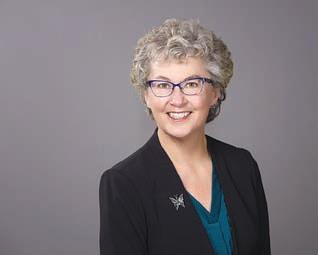
une is Alzheimer’s & Brain Awareness
Month — an annual reminder that Alzheimer’s disease and other dementias are a major public health issue. In fact, according to the Alzheimer’s Association, more than 50 million people worldwide are living with Alzheimer’s disease or dementias, including the six million in the U.S.
diagnosed with Alzheimer’s disease.
When a loved one has Alzheimer’s disease or dementia, we mourn that profound loss, yet there’s no public ceremony to mark emotional voids.
“Society” does not acknowledge our grief. We are left to lament alone.
In her book, “Loving Someone Who Has Dementia,” Dr. Pauline Boss addresses this very issue. She has coined the term “ambiguous loss” to describe the sensation of when your
loved one is physically present, yet psychologically absent.
To manage the experience, she suggests “both/and” thinking. She encourages us to practice carrying contradicting thoughts, simultaneously. We must reconcile that our loved one is both here and not here, and make peace with the “good enough” relationship we have.
While we bemoan the loss of our giveand-take relationship, we can embrace the moments we are together, just sitting on
the couch in the family room, standing at the kitchen counter or riding in the car. We promote Boss’ concepts in our free support groups at Duet, and we offer a free video discussion series featuring her titled “Finding Meaning and Hope.”
Consistent feedback proves the efficacy of her groundbreaking outlook. Ninety seven percent of caregivers say this program reduced their stress, helping to
keep them from becoming dementia’s second casualty.
Recognizing the value of our series, the Arizona Department of Health Services has brought the program to county health departments throughout our state. Arizona ranks first in the nation in new incidences of Alzheimer’s.
Many of us at Duet have experienced caregiving and dementia in our own lives. My sister, a brilliant landscape architect, was diagnosed on her 50th

birthday with a rare form of dementia. By the time she died, our father had been diagnosed with Lewy body dementia, and shortly after, our mother developed Alzheimer’s.
Many times our family’s 15-year journey with dementia brought my siblings and me to our knees. Boss never minimizes how excruciating our circumstances are. Rather, she challenges us to view the experience through a different lens, and provides the tools to restore
meaning and hope in our lives.
It’s universal to grapple with guilt and grief. Boss lays out guideposts for us to manage these paralyzing emotions. Rather than duel with guilt, we can normalize it. And we can acknowledge our grief, while dwelling on gratitude.
We wonder if we can make it yet another day. We do.
Commiserating with others who “get it” in support groups, we establish
camaraderie. We do not have to stand alone, together. We can stand together.
Boss calls this a psychological family — a family of our heart and mind that has our backs as we share the journey. At Duet, we aim to partner with you along your journey, helping you allow a little sunshine to break through. JN
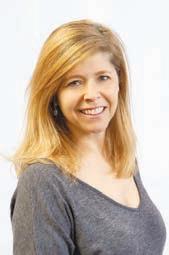
he past school year has tested everyone. We have learned much about education, technology and ourselves. While more people get vaccinated and consider taking a long-awaited summer vacation, there is something else to consider — the summer slump.
The gap of time between students’ last day of school in the early summer and when they start again the next fall, is what education researchers have called the summer slump. Standardized tests show students losing a step in their academic achievement, so researchers created studies that have tried to identify why this gap or learning loss is happening as well as what it means.
Each year we learn a bit more about
Thow to avoid the slump and how to keep students from regressing in their academics over the summer. But when COVID hit and teaching went online, a different kind of learning loss started to emerge. The pandemic did not just force schools to remain remote, it also prompted some students to leave the public school system and opt for private schools, homeschooling and “pandemic pods” where several families chose to quarantine together.
Unfortunately, moving schools or staying home was not an option for everyone. Lower income schools were not able to switch to remote learning and the families in those districts lacked basic needs, like high-speed internet and conducive learning environments with quiet spaces and minimal distractions. Some older students simply chose to drop out of school.
Though this has not been labeled a
crisis yet, new studies suggest that some students might have lost a full year of learning due to COVID.
But there are options for improving the situation, from summer classes and tutoring to online enrichment programs and accessible education software.
Then we have students with learning challenges, another group grappling with COVID. While daily struggles already existed for these students, COVID brought a new set of challenges.
Hope Kirsch, education attorney of Kirsch-Goodwin & Kirsch, PLLC, said when the schools first closed, the phones at their office were quiet. It seemed everyone was willing to take it in stride and do the best they could. Many people remember the stories of teachers going the extra mile delivering packets of materials to their students’ homes and waving to each
TALIA HOFFER AND ELLIE SIMS
hursday, April 29th, we had the honor of visiting the Navajo Nation in Northern Arizona along with six Arizona Jews for Justice volunteers.
We started early in the morning — it was around 5 a.m. when we retrieved our rented van, recited a quick bracha and hit the road.
The team was sitting shoulder to shoulder, which would have felt like a hardship, but because half of our van was filled with donations, we could deal with a little discomfort. It gave us a greater sense of purpose knowing that we were accompanied not only by our closest co-workers, but also life-saving supplies for a community in need.
The pandemic has hurt us all, but for
the Navajo Nation, COVID hit especially hard. When the first surge hit nationally, the Navajo Nation experienced higher rates of death and spread of disease than many other areas, partially due to the lack of personal protective equipment and general supplies.
A year later, however, they are one of the highest vaccinated populations in the country and are quickly recovering from COVID, according to one representative we met.
The reservation was filled with positive messages of recovery and encouraged vaccinations. We saw many artistic signs that read, “First dose protects me, second dose protects you,” and “Stay home, protect our elders.”
Our drive through the reservation was characterized by vast natural scenes. The land exuded a radiant beauty. As we drove
to a chapter house to meet with local officials, we noticed houses were sparse and modest in size. Horses, sheep, cows and dogs were given ample space to live freely. It was one of the most beautiful and natural sights we had witnessed.
All that we saw resonated with our Judaism — we are told to protect our animals and land, which we hadn’t internalized until now. Our suburban houses were not under attack, our domesticated dogs would be just fine. But that’s not what the Torah means — it means to protect places like this, so the vibrancy and love might flourish for future centuries.
Arriving at the Nation’s chapter house, one particular structure stood out — a singed building. The chapter president shared with us that an arsonist had burned another structure, and no remnants
other through glass doors.
A Gesher parent said the printer became a lifeline for her family because her child could not quite grasp the concept of transferring information from a worksheet online to a separate screen or Word document. When their printer wasn’t working, her child’s teacher arranged for a parent pick-up of the packets with the printed materials — it was as simple as driving up to the school so the teacher could place the packet in the backseat or trunk.
While ZOOM quickly became everyone’s friend, Gesher teachers learned ways to keep their students engaged and then shared new ideas as well as free resources with the teachers and staff at the Jewish day schools. Since everyone was getting used to Google
remained. Then the wind blew the fire into the second building. The roof completely collapsed and took down the interior, which we presumed must have been stunning. Only a gorgeous interior could match the architectural beauty of the remaining exterior.
We began unloading the numerous supplies donated by our generous community members. There were canned goods, masks, cleaning and office supplies. They were for utilization within the offices of the official Navajo governance, as well as for distribution throughout the community. The area is a massive food desert, with vastly limited options for groceries. That is not unique to this land, but the lack of access to food was
SEE HOFFER, PAGE 15
he parshah and Haftorah of Sh'lach Lecha tell of the arrival, rejection and eventual return of the Hebrews to the Promised Land. At first, they are denied entry when 10 scouts bring a terrified report, and the people doubt God’s commitment to them. Decades later, their descendants craft a plan, and place their trust in the prostitute Rahab. They are granted entry.
Moses, newly arrived somewhere between wandering and settling down, sends 12 chieftains to reconnoiter the land. They explore the entire expanse, south to north and in between. They find a place of oversized bounty: enormous grapes, pomegranates and figs and, in a timeless phrase that connotes ceaseless fecundity, nourishment and sweetness, a land “flowing with milk and honey.”
(Numbers 13:27)
In the Torah, the settings of scenes convey rich metaphoric, symbolic and
HUMMELL
CONTINUED FROM PAGE 14
Classroom, they then learned KAMI, which offers free materials so a teacher can create appropriate and individualized curriculum.
As soon as the schools opened, Kirsch said the calls started. She heard from parents who were told by school administrators or special education teachers they could not implement individual education plan services, including the related services of occupational therapy, speech and physical therapy due to COVID. This was in direct violation of state laws in special education.
Kirsch told families to keep a log tracking missed learning through the winter so they could review in the spring. Since then, many of the public schools sent letters to families sharing the child’s progress, what was missing and offering academic support even over the summer. “Kids are resilient, but there will be a gap to close. Summer learning can only help,” said Kirsch.
The pandemic seemed to expose problems that had long existed within school systems. It also amplified the importance of everyday learning. The classroom is a critical space for all students and where professional educators work on core subjects as well as socialization.
emotional meaning. The powerful imagery of this passage has resonated for millennia; the image of two men carrying a cluster of grapes, symbolic of Israel’s produce, is to this day the logo of the nation’s ministry of tourism.
The Torah’s expansive description of the Promised Land is enticing, but it provides too many options. When every choice is possible, it is hard to make any. No wonder the 10 scouts felt small. They were not small compared to the inhabitants; they were small compared to the wide-open space. They knew they were no match for it, that they were unable to inhabit it fully.
This week’s Haftorah, by contrast, is set in a city: Jericho. More specifically, it takes place in a brothel, and features the constructed elements of urban life: houses, rooftops, windows, walls, gates. These create a very different setting, with different metaphoric meanings.
Built elements indicate choice. Someone decided to place the wall here, not there. Someone chose to build the gate there, not here. The built environment signifies a mastery over the land — something missing in this parshah.
More specifically, walls symbolize
division. They demarcate space and, symbolically, time. Walls signal here and there, inside and outside, before and after.
In the parshah, the Hebrews could have entered the land but did not do so. With no boundary signaling before and after, their journey was not yet complete. They were unable to arrive. In the Haftorah, by contrast, the city wall signifies an end to their travels, and the commencement of a new phase of life.
But walls keep out. How can this wall signal entrance?
This wall is pierced by gates (Joshua 2:5, 7) and a window (verses 15, 21). Gates and windows both beckon and bar. “Gates stand between here and there, between the known and the unknown.” (The Book of Symbols, Taschen) When we pass through a gate, we are aware of leaving one space and entering another — and, with rites of passage, we become aware of leaving one phase of life and entering another. Gates make us conscious of transition.
When the Patriarch Jacob dreamt at Beth El, he saw a ladder rising to Heaven. He identified that place as “Sha’ar HaShamayim” — the gateway to Heaven. (Genesis 28:17) In our Haftorah, the
HOFFER CONTINUED FROM PAGE 14
Outside of school, our Gesher families found the importance of taking a break from all the screen time. They found experiences outside, drove to cooler destinations in the summer — perhaps staying in their car the entire time — while playing the Billboard Game, singing songs and taking pictures.
While we all need a break from online learning after this school year, it does not mean that our students can stop learning for two months. As we head into summer, there are many organizations offering fee-based courses as well as school districts providing free courses to brush up on skills.
Raising Special Kids has a comprehensive list of sports camps, art camps and academic-focused camps in its Raising Arizona Kids magazine.
And then there are free online sites like Kahn Academy or Master Classes that cover a multitude of subjects. Review your options and know that some online learning can still be a good opportunity for your child to grow while you get a chance to take a break. You have the power to close the gap and stop the summer slump. JN
particularly prominent here.
The Navajo Nation was extremely generous in hosting our organization. It was lovely to hear from their perspective how vaccination rollout is going, how their community is still recovering and how their spirituality and community are bringing them through it all.
This reminded us very much of the Jewish community’s connection to healing and communal welfare. We both pray for the healing of not just ourselves, not just our immediate families, but for our larger communities and the world as a whole.
We then discussed how we can continue to work with each other, and how important it is that marginalized communities work together to achieve our goals, rather than fighting among ourselves for limited resources. It is essential that we look at ourselves as part of a larger community of people who are fighting for justice.
From the reservation, we began to make our trek back to Phoenix. While this felt like a long, difficult trip, it reminded us that many people have to make trips like this every day for school and work.
This trip to the Navajo Nation was one of the most eye-opening and unique
JUNE
gates of Jericho become the gateway to the Promised Land, and a symbolic rite of passage for the Hebrews.
Further, Rahab ties a rope to her window to allow the two scouts passage. Ropes symbolize ascension — in this case, the ultimate aliyah.
Human beings need to mark transitions: before/after, inside/outside, living/ dead. Without them, we feel unsettled, incomplete. But God, who is all things at all times, experiences no such binaries and feels no such need. Rahab, herself an “in-betweener,” understands this deeply when she describes God as “the only God in heaven above and on earth below” — that is, as the ultimate Transcender of Division. (Joshua 2:11) JN
experiences we have had with Arizona Jews for Justice. While we constantly work on our advocacy, the opportunity we had to show up and work on our action was so meaningful.
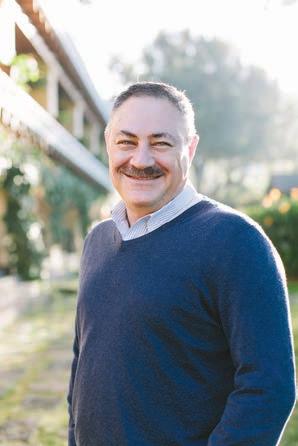
It is vital that we continue to have the conversations we’ve been having about injustice in Arizona and throughout the country, as well as showing up for our community and providing the necessary support and kindness, which we are so privileged to do. The relationships we’ve created with our native community has allowed us to work towards stronger allyship and communal support, and we see the importance of this firsthand as our communities have both been under attack for centuries.
We want to thank our donors who funded this meaningful trip, community members who provided us with donations and the Navajo Nation for hosting us. It was a life-changing experience to see the work they are doing, the conditions of indigenous land and the holiness of the space we were in. JN

 NICOLE RAZ | STAFF WRITER
NICOLE RAZ | STAFF WRITER
More than a decade ago, Ettie Zilber set out to tell her mother’s story of surviving the Holocaust.

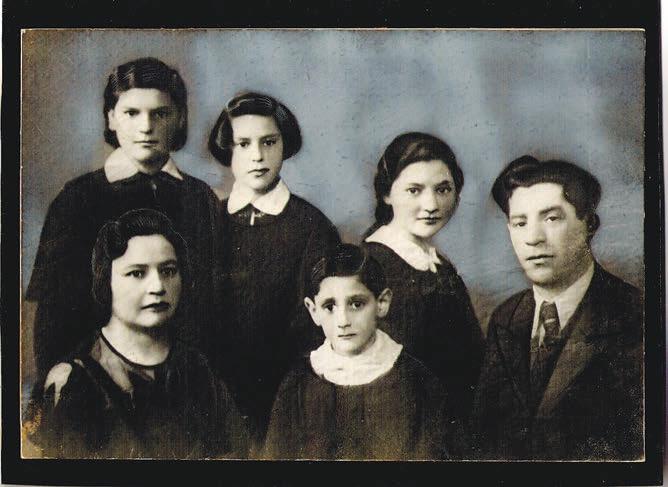
“I had no intention of writing a book or publishing a book,” she said. “I just wanted this for my family, for my kids and for my grandchildren.”
Her mother, born Zlata Santocki Sidrer in Lithuania, was a teenager when the Russian occupation of the country began in 1940. “It became a little dangerous and frightening, but nothing compared to one year later when the Nazis came in,” Zilber said.
Her mom and dad met in the ghetto, where Sidrer witnessed massacres, imprisonment, hunger and slave labor before being transported to the Stutthof concentration camp near the Baltic port of Gdansk, Poland.
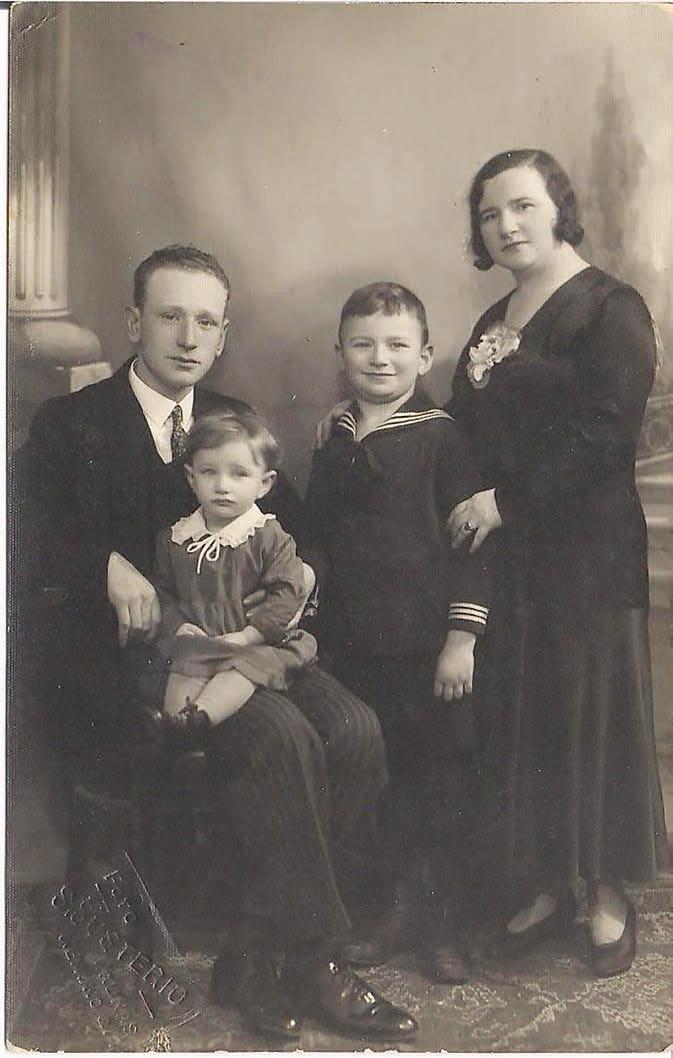
Zilber wrote her mother’s survival story and what it was like growing up the daughter of survivors in “A Holocaust Memoir of Love & Resilience: Mama’s Survival from Lithuania to America” (Amsterdam Publishers, 2019). Beginning this month, she will present a four-part virtual series on her family’s story through the Jewish Family & Children’s Service Senior Enrichment Center in Phoenix.
“There’s always something new to hear if you’re interested, so I hope that anybody who is interested in learning will attend,” Zilber said.
Zilber and her sister interviewed their mom in 2007 but never had the opportunity to interview their father because he died of cancer when he was young. “I was determined to get my mother’s story while she was still alive,” Zilber said, and she’s also determined to tell it.
During her time as an educator and head of school, she shared her family’s story with students.
“I think it’s important for every kid to know their heritage. So that’s first and foremost,” she said. Her other goal is to educate the public about the history of the Holocaust as survivors age and pass away.
Making sure that history is known is important now more than ever as antisemitism is on the rise, Zilber said. A survey by Pew Research Center released in May found that 53% of American Jews say that, as a Jewish person in the U.S., they personally feel less safe than they did five years ago.
After her book was published, she also began getting invitations to speak all over the world. The pandemic canceled those visits, but she’s still been speaking with global audiences via Zoom.
“In the last two years, I must have given over 60 presentations, including to a school in Lithuania. Zoom has become a bit of a blessing in that respect, because I could give many more presentations than I ever could possibly travel to,” she said.
Jennifer Brauner, director of JFCS’ Senior EnrichmentCenter, said she approached Zilber after learning about her presentations on social media.
“I felt that this would be a very important program to offer to my senior participants, especially those that can relate to the Holocaust,” she said.
Zilber hopes that those who have heard her speak about her family’s history have gained some empathy. “Large numbers don’t touch people’s hearts or minds,” Zilber said, but personal stories do.
As part of her journey in learning and recording her family’s history, she reflected on how it shaped her own experience.
“Not only me, but my cohort of children of survivors, we all have certain behaviors and certain thoughts of things that we actually never experienced ourselves,” she said.
Being the daughter of Holocaust survivors who experienced hunger, for example, she grew up with a distinct relationship with food.
“In my home, food was a focal point. Leaving food on your plate was not an option. Being a picky eater was not an option,” she said.
The first presentation in the series is June 23 at 1 p.m. via Zoom. Titled “As Mama Told Us,” the event will focus on the details of the war.
The second presentation will be about the postwar years — from the moment of liberation until her family’s arrival in America.
“Everybody was liberated in a different place, by a
different military with a different army. So everybody had a different experience and a different timespan of
She titled her second presentation, “From Liberation
Next, she’ll present about the impact of the Holocaust on survivors. “There is no one experience for every survivor,” she said. “But there is a spectrum of experiences that most survivors had, so I will try to give a little summary from the literature of the impact with
And finally, she will present about the impact of the Holocaust on the second generation.
Brauner said each presentation has an important message. The first one will lay the foundation to understand all those that suffered in that time period, she said. JN
To register for the free series, visit jfcsaz.org/cse, or contact Jennifer Brauner at seniorcenter@jfcsaz.org or 602-343-0192. Book available for purchase at getbook.at/Zilber.

By the time Neal Bendesky had his bar mitzvah, he knew that as much as he loved sports, he was better suited to sports management than as an athlete on the field of play. And while that saved him from the injuries prone to athletes, decades of working in a high-profile career in marketing and sales for a variety of university and professional sports teams still came with a physical cost.
By the time he turned 53 in 2014, he weighed 450 pounds. Years of traveling, sitting at a desk and stress had taken a toll. While talking to his doctor in Florida, he learned that he had some circulation issues and was on a dangerous path in terms of his overall health. “And bottom line is, they told me that I was technically morbidly obese,” he said.
Hearing those words said aloud alarmed him. He was already struggling with chronic fatigue and couldn’t be as active with his kids as he wanted, but the doctor’s warning made him wonder if he would die of a stroke or a heart attack.

“I felt there was a clock going in my head — my wellness clock,” he said. “And it clicked that it was up to me. It’s now or never.”
Still, it wasn’t until he moved to Chandler the following year to work for the Arizona Rattlers, a professional indoor American football team, that he was struck with the realization that as someone promoting athletes on the field, it was time to start living the part. He was determined to acquire his motivation to live a healthier life, and he had what he calls his “accountability moment” at the Orangetheory Fitness in South Chandler.

Bendesky’s weight loss goal of about 200 pounds was much larger than what most people are looking to lose when they join a gym, but he believes that shouldn’t make a difference. With the right motivation, he said, no goal is too big, pointing to the 14 half marathons he’s run over the course of his journey. Having achieved his target weight, he calls himself “the 199 Guy.”
He also is a motivational speaker, promoting Orangetheory and describing his personal journey for various audiences. It’s work that comes naturally to him, he said, since his father sang in a barbershop quartet with him and his two brothers. They would perform at bar mitzvahs and weddings, where Bendesky developed a taste for the stage.
He has a few go-to stories he shares with audiences, even a few that he described as embarrassing. He tells how he felt in meetings as a representative of sports teams. As sharp as he might have felt mentally, physically he didn’t look the part, which undermined his
confidence. He talks about dining at a pizzeria where one of his sons worked, and when Bendesky asked for a third slice of pizza, his son advised him to have a salad instead. “Technically, I was hearing the advice, but I didn’t listen,” he tells his audience.
Then there’s the story that stays with him most. It happened after he had already begun his transformation but was still quite big. He was standing outside his workout studio in Chandler wearing a large, red pullover when a little boy looked at him and asked if was Santa Claus. Ultimately, the incident gave him more motivation on his journey, he said.
He knows very well how daunting it can be to walk into a workout class initially — seeing younger and fitter people doing difficult athletic moves is intimidating and makes people feel they can never catch up, he tells his listeners. He reassures people that “it’s not about being the best,” he said. “It’s about finding your best self.”
Now 63, he advises fellow seniors, “it’s not about age at all — it’s about your attitude.”
Bendesky compares his old attitude to a flat tire. “If you don’t fix it, you don’t go very far,” he said. “Just as with Jewish culture, it’s attitude and gratitude, and if you live in those two words, you can have your own journey and be successful.”
He also tells audiences about having been addicted to food, and learning about nutrition as well as exercise. “It’s never too late to figure out the value of nutrition,” he said. Better nutrition is the key to having more energy for your life, for your family and for your career. And no matter someone’s age, he said, these lessons are worth learning and can make anyone’s life better.
“It’s never too late to mount a comeback,” he said.
When COVID-19 struck and its restrictions kept him from the gym, he turned to the Orangetheory’s Zoom workouts. “I’m at an age, where I wasn’t supposed to go anywhere, so I had to find something to keep me going,” he said. He set up an area in his family room where he could do the 30-50 minute workouts. Although it wasn’t the same, “the heart and intent was there,” he said, “and it really did carry me through.”
Now that he’s able to go back to the gym every day, he feels as if he barely lost a step. It’s not any old gym, he said. It’s a place that has helped him reach a pinnacle of good health, physically and mentally. “I might have had my best years from a professional standpoint,” he said, “but I feel like I’ve added another 30 years to my life based on the program I do every day.” JN
“JUST AS WITH JEWISH CULTURE, IT’S ATTITUDE AND GRATITUDE, AND IF YOU LIVE IN THOSE TWO WORDS, YOU CAN HAVE YOUR OWN JOURNEY AND BE SUCCESSFUL.”
Ellen Tuckman is currently gathering items for Cactus ORT’s auction on June 6. Among them are a set of luggage, a Waterford decanter, a one-week stay at a Caribbean hotel, restaurant and museum certificates and jewelry. The money raised at the Zoom auction will be sent directly to ORT America, the organization’s national office.
ORT’s mission is to impact the lives of young people through education and to create opportunities for self-sufficient futures. Its network includes schools, colleges and international programs with more than 300,000 students in more than 30 countries.
The June auction has significance for the Cactus chapter beyond the money it hopes to raise for schools. It will be the first time the chapter has held any event since before the COVID-19 pandemic began. Instead of going online as other organizations did, Cactus members have stayed in touch only through telephone conversations and email.
Tuckman, 78, is no longer Cactus’
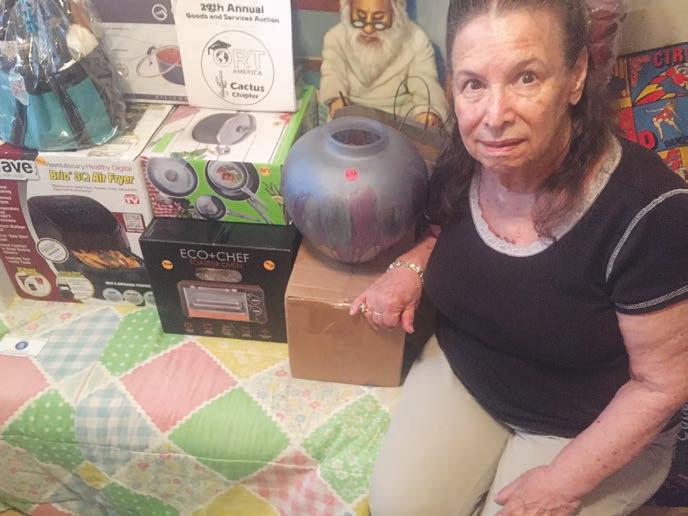
president, but still does most of the work, she joked. Her official title is vice president of fundraising and meeting facilitator; Michele Gusdorff is publicity chair; Robin Balon is head of programming; and Tuckman’s husband, David Tuckman, is treasurer. The chapter has 40 members.
Over the years, four other local ORT chapters closed due to declining membership. Cactus is the only one still standing in Greater Phoenix, and its youngest member is in her 60s.
But it wasn’t always so.
Tuckman heard of ORT through family but she only joined after moving to Phoenix, and even then it was a bit of a lark. A neighbor invited her to a meeting and because she wanted to meet people and get involved in the community, she went. But maybe the most important reason, she said, was “I had a ride to the meeting.”
And she was curious. At the first meeting everyone was assigned a role and she became the secretary. “I just came to find out about it and we all got stuck with a job,” she said.
But she also liked ORT’s mission of setting kids up for success through education
— especially since she was a teacher. And while she started off in Scottsdale’s chapter, she soon transferred to Cactus in Phoenix when another friend invited her. The members of Cactus were in their 40s like she was, and at that time, Scottsdale’s members were still having babies. There was even a time when she was able to see firsthand the results of the organization’s actions. Preparing for a trip to Prague, she asked ORT’s national office for the address of its school program there. The ORT teacher was out sick the day she visited, but she still knocked on the door and got a tour and video presentation, not to mention tea and cookies. It was nice to see where the funds she raises go, she said. ORT’s membership also generally overlaps with that of Hadassah and Brandeis National Committee, Tuckman said. They all share the same difficulty in attracting new and younger members.
via email. “It’s also nice to support and be involved with groups of like-minded women.”
Foreman suspects this is more true for women of her generation than for younger women. “I was taught that you don’t need to be super active in them all but to join and support if you agree with the mission,” she said.
Tuckman suggested many younger people are just too busy to join organizations. And she can understand why they might not want to join a group of retired people. She recalled going to a B’nai B’rith meeting as a young woman

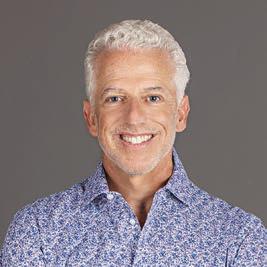

During the pandemic, we have collectively increased awareness of what the experts in their fields had on their radar all along.
The epidemiologists were predicting this pandemic. Public health experts have been bracing for problems caused by underfunded infrastructure. And health care experts have long known that social determinants of health, such as gainful employment and stable housing, have an overwhelming effect on well-being.

In home care, we are all too familiar with the epidemic of loneliness experienced by seniors, and the pandemic shined a huge spotlight on it.
Older adults are more likely to live alone in the United States than most other places in the world. Forty-three percent of Americans over 60 identify as lonely and nearly 30% of Americans over 65 live by themselves.

Isolation and loneliness are often linked, but they are not the same. Isolation is an objective state of not having much contact with the world, which is what many experienced during the pandemic. Loneliness is subjective. It is the feeling that the contact you have is not enough.
Both isolation and loneliness are thought to prompt a heightened inflammatory response which can increase a person’s risk for a myriad of medical conditions including dementia, depression, high blood pressure and stroke.

Research published by AARP and Stanford University found that social isolation adds nearly $7 billion a year to the cost of Medicare, in part because
isolated people show up to the hospital sicker and stay longer.
My question is, can our shared experience of isolation and loneliness be the impetus to address these perils routinely experienced by seniors?
Working from home and blank social calendars forced us to be creative in reaching out and connecting with friends, family and co-workers. Many report that in some cases these new routines produced more consistent contact within these social circles. It is vital to continue to reach out and nurture those relationships that have become the silver lining of the pandemic.
We should encourage seniors and young people to collaborate to elevate technology skills. We know that they were life lines during the pandemic, and these skills will continue to be important in the future.
As our world opens up for vaccinated people, we should take an older adult to lunch. These social connections are more important than most people realize. As we age, having close ties to others and participating in meaningful activities are associated with keeping the mind sharp and memories strong.
After worrying about our health for the past 16 months, it is great to know that rekindling relationships, especially for seniors, is exactly what the doctor ordered.
People talk about the potential for a repeat of the Roaring ‘20s decade that followed another global pandemic a century ago. Who is not ready for a time of jubilation and connection after the loneliness of the past year? JN
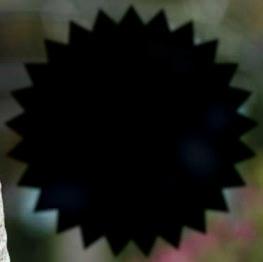
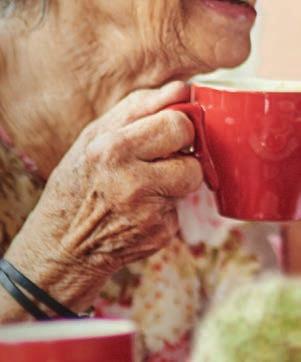 DEBORAH LAVINSKY
DEBORAH LAVINSKY
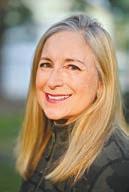
What do former Arizona Governor Rose Mofford, actor Gary Coleman, writer Kurt Vonnegut and songwriter Leonard Cohen all have in common? Sadly, they all died from a fall.


According to the Centers for Disease Control and Prevention, one out of every three adults aged 65 years or older in the United States will suffer a fall. Ninety-five percent of those falls cause hip fractures. With our beautiful Arizona climate, many falls happen on hiking trails. Slipping on loose gravel, losing your footing, misjudging the steepness, becoming dehydrated and dizzy frequently occur. Falls can happen outdoors and in your home.
My prevention philosophy is simple to remember: strong, steady and straight. Strong means doing weight bearing and resistance exercise regularly. Steady means practicing your balance. Straight means strengthening your back muscles for tall posture.
Health experts tell us to maintain a regular exercise program in order to increase strength, balance and coordination. Exercise classes like Buff Bones, a medically-endorsed bone health and balance program or Tai Chi

are designed to improve those three areas. Walking, weight-bearing exercise, swimming and stationary bikes are also great ways to improve physical conditioning.
The following are all risk factors for a fall:
• Having fallen in the past year.
• Poor strength, vision, balance, posture or foot health.
• Health concerns such as stroke, Parkinson’s Disease, Multiple Sclerosis, dementia, traumatic brain injuries.
• Taking medications such as sedatives and opiates.


• Footwear.
• Home hazards.
• Pets.
Let’s look at a few factors you can easily control.
To create a safer environment in your home, eliminate slippery throw rugs and loose electrical cords, improve lighting, move furniture out of the way of common pathways, don’t walk on freshly washed floors, reduce floor level clutter and mark uneven surfaces with bright tape — especially steps with low contrast tile/carpet. Kids and dog toys can also cause falls. Add night lights along nighttime pathways. Installing grab bars and hand rails can help keep you upright.
We love our precious pets but unfortunately, they are a common cause of
trips and falls. They want to be close to us and are often underfoot. One of my clients fell over her golden retriever on her stairs and broke her hip. Another was walking her dogs and got tangled in their leashes, fell and broke her wrist. Building awareness of where your pets are when you are moving about can help you stay upright. Make sure their bedding, food bowls and toys are not in your common walking paths. Shoes are another controllable factor. Sneakers are often inflexible like cement boots and make it difficult to feel what your feet are doing. Flip-flops cause excessive toe gripping and offer no arch or ankle support. High heels and details like bows, straps and ties can also contribute to falls. Wearing just socks can cause you to slip and fall. Alternate your footwear and choose softer, more flexible sneakers with non-skid soles. Here are a few easy moves that will have lasting results for your balance. Practice these barefoot on a firm surface 10 minutes a day and you will see improvement very quickly. Be sure to have a sturdy chair back, a hiking pole or railing to help you balance.
• Standing with your feet under your hips, identify the ball under your big toes, baby toes and heels as your “tripod” foot. Lightly lift the arches and gently press your toes down into the floor. Do this 5-10 times.
• Lift all ten toes at the same time, hold for five seconds then firmly press your toes down into the floor. When this feels easy try doing alternating feet. Feel the stretch into your shins, inner thighs and pelvic floor. Do these 5-10 times.
• With feet parallel and hip distance apart, gently lift your heels off the floor, then lower down with control. Practice this 5-10 times.
• Stand with both feet together with arms at your sides like a candlestick. Turn your head slowly to each side, stopping midway. Try doing this by closing your eyes or one eye at a time for more challenge. This improves your vestibular (inner ear balance) system.
• Stand tall and place heel to toe moving forward a few steps then backwards. Observe your balance shifting in each direction.
Preventing a fall can mean the difference between living independently or moving into a care facility. Let’s keep you healthy and upright. JN
Deborah Lavinsky, NCPT® is the owner of Phoenix Pilates and Rossiter Center, a nationally certified pilates teacher and licensed Buff Bones® instructor. Her website is phoenixpilatesandrossitercenter.com



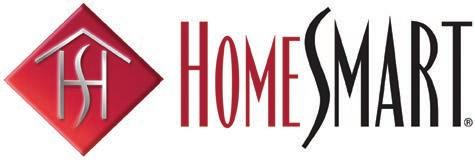 SHANNON LEVITT | MANAGING EDITOR
SHANNON LEVITT | MANAGING EDITOR

On Wednesday, June 2, the Phoenix Theatre Company begins its 102nd season — indoors and in person — with a production of “Becoming Dr. Ruth.” The one-woman show tells the life story of the famous Jewish sex therapist and Holocaust survivor, Dr. Ruth Westheimer.
The show opens with Westheimer, played by Debra K. Stevens, on the floor of her apartment surrounded by a chaotic array of boxes as she prepares to move. Quickly Stevens breaks the fourth wall and speaks directly with the audience, which she does for the next 90 minutes. “Being alone on stage and talking for an hour and a half is a real test of endurance for my first show after COVID,” Stevens joked.
Sifting through her things as she packs, Westheimer is reminded of the people and milestones that mattered most to her. In this way, she is able to recount her remarkable and varied life story. Highlights of her tale include fleeing from Nazi Germany on the Kindertransport; living in Jerusalem and serving as a sniper in the Haganah, a paramilitary organization that existed before 1948; arriving in the United States as a single mother; and becoming a world-famous sex therapist hosting a highly-rated and controversial radio show called “Sexually Speaking.”
Jodi Weiss, Stevens’ understudy, is Jewish and was able to ensure that some of the props being used were culturally appropriate to the real Westheimer. For example, Weiss noticed a menorah on the set that she argued should have been a Chanukah menorah. When she explained why this detail mattered, the director was convinced. Weiss also helped with pronunciations of Hebrew words and phrases like “tikkun olam.” However, given Westheimer’s years of living in so many countries and speaking so many languages, Weiss admitted trying to mimic an accent so distinctive will be tricky.
Stevens, who is not Jewish, is excited to portray Westheimer. She hopes she can “capture her essence” without turning her into a caricature. To prepare for the part, she diligently researched Westheimer by watching her documentary, reading articles and listening to many episodes of her radio show. “You have to read a lot,” Stevens said, “because there’s an obligation when you
girl can be.”
Katie McFadzen, the show’s director, is also not Jewish but has always been fascinated by Judaism. She, too, has learned a lot from her Jewish friends.
When Michael Barnard, producing artistic director at The Phoenix Theatre Company, first sent Stevens and her the script as a “perfect possibility for the two of them,” neither had heard of the show. But when they did their first read through, “we both felt incredibly
connected to it right away,” McFadzen said.
Earlier in her career, McFadzen had been in “And Then They Came for Me: Remembering the World of Anne Frank,” for which she researched the Holocaust as well as the cultural and religious aspects of Judaism.
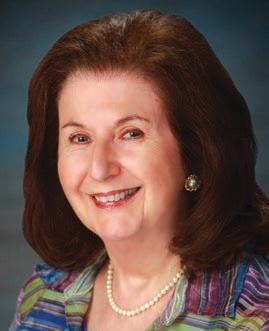
“It was a powerful story for young people, but a difficult play to do,” she said, “because when young people are uncomfortable they tend to act out, so we had to stop and talk about it with the kids when those moments came up.”
She also thinks “Becoming Dr. Ruth” is an important play to do now with so many survivors passing away. “There’s a lot of revisionism right now in the world,” she said. “Telling this story is important so people remember.”
The theme for the theatre’s season is resilience and both McFadzen and Stevens said this show encapsulates that idea well. “Dr. Ruth doesn’t consider herself a survivor of the Holocaust but an orphan of the Holocaust,” McFadzen said.
“If somebody can be about resilience, it’s Dr. Ruth,” said Stevens.

Barnard said that everyone at the theatre is “unbelievably grateful to welcome audiences back into our home. The last year brought countless creative and financial challenges, but we weathered them and have come out stronger.”
McFadzen and Stevens are both employees of Childsplay Theatre Company in Tempe, which means they perform and teach throughout Greater Phoenix. Both are happy to be back on a real stage in front of a live audience after the past year of Zoom readings, online programming, drive-in theater performed in library parking lots and recording four one-person shows that they’ve offered to schools for free.
“It’s wonderful to be fully vaccinated now,” said Stevens, “and having actual faces with lights in the theater is going to feel amazing.”
“Becoming Dr. Ruth” will be on The Phoenix Theatre Company’s main stage starting June 2 and will run through June 27.
To ensure safety, face masks will be required and temperatures will be checked before entering. However, seating will not be socially distanced. JN
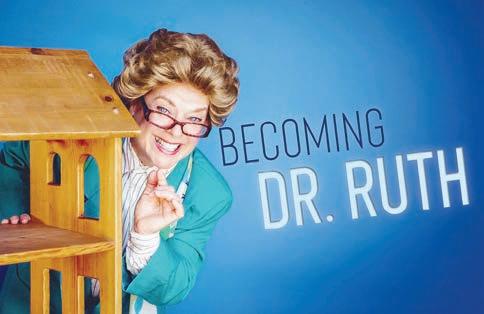

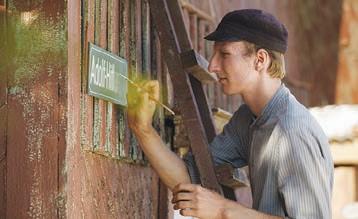

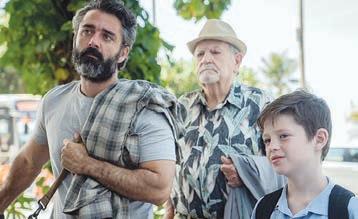
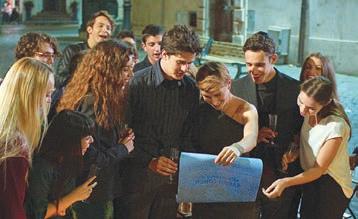 STEVE CARR
STEVE CARR
Neil Friedman likes to think of his company, Menemsha Films, an exclusive distributor of Jewish and Israeli films, like a Jewish book club.
“Every film we release is something that interests me and grows my knowledge of my cultural history,” Friedman said. He looks at the films the company produces as “cultural education,” which he hopes to share with others.
“My business is a big version of a Jewish book club,” he said.
Several of Menemsha’s films will be screened at this year’s Sedona International Film Festival June 12-20.
Friedman’s company has set a record of discovering and representing five Academy Award nominees five years in a row. Among the company’s most recent releases is “Asia,” which won nine Israeli Oscars including best picture.
Starring Shira Haas, the Golden Globe and Emmy Award-nominated star of “Unorthodox,” Asia, played by Alena Yiv, is the single mother of 17-year-old Vika, played by Haas, whose deteriorating health leads Asia to finally find her voice as a mother and to embrace and cherish their time together. “Asia” will screen Friday, June 18 at 10 a.m. at the Sedona Performing Arts Center at Sedona Red Rock High School.
“This is a remarkable film,” Friedman said. “I look at 250 films a year to find 15 or 20 that we want to release. If I’ve done my job the right way, those 15 films will play in 150 film festivals in North America.”
Another Menemsha-distributed film in this year’s Sedona lineup is “Winter Journey,” a German film based on
National Public Radio host Martin Goldsmith’s book about his Jewish parents who fled Nazi Germany. Both were talented musicians but under the 1935 Nuremberg Laws, they were only able to perform as members of the Jewish Cultural Federation, a bizarre propaganda organization fully controlled by the Reich Chamber of Culture.
The film brings to life the reality of their beautiful and painful love

“We have seen a growing number of phenomenal Jewish films submitted to our festival,” said Pat Schweiss, the festival’s executive director. “These are truly moving, powerful and timely films that provide insight on a range of topics. Given the current state of affairs in the world and in Israel, in particular, these films are incredibly important and relevant as a means of healing and creating peace. We are deeply honored to include
diagnosed with autism and includes footage from Phoenix coordinated through Southwest Autism Research & Resource Center and First Place.
More than half of the nearly 180 films in this year’s lineup are documentary, narrative and animated shorts. That group is complemented by fulllength narratives, documentaries and special events.
As a result of the ongoing pandemic, the number of evening events will be limited and theater capacity will be around 60% to allow social distancing. Masks will be required in lobbies but can be removed once patrons are seated in the theaters at the Mary D. Fisher Theatre, Sedona Performing Arts Center, Harkins 6 Theaters and in the Enchantment Resort ballroom converted into a theater.
As part of the festival’s effort to ensure the health and safety of patrons, staff and volunteers, pass holders and individual ticket buyers will be able to choose their seats. Staggered start times will allow filmgoers to move directly to their seats when the doors open.
story using edited archive material, including re-enactments of conversations Goldsmith, who plays himself in the film, had with his father as preparation for the book. His father is played by Bruno Ganz, his last part before he died in 2019. It will screen Sunday, June 13 at 10 a.m. in an Enchantment Resort ballroom converted into a theater and at 10 a.m. on Sunday, June 10 in the Harkins 1 Theater.
“Asia” and “Winter Journey” are among ten Jewish-themed or Israeliproduced films in this year’s festival from a number of distributors.

a vast selection in our festival as we truly believe the world needs to see, hear and experience these stories.”
Others scheduled for screening are “Back to Maracanã,” “Broken Mirrors,” “A Starry Sky Above the Roman Ghetto,” “Sublet,” “The Unorthodox,” “Here We Are,” “Enchantment,” “The Sign Painter” and “Thou Shalt Not Hate.”
“In a Different Key,” a film focusing on autism and the winner of best documentary at the Sonoma International Film Festival and Oxford Film Festival will also be screened at this year’s festival. The film follows the story of the first person

All Access Passes and ticket packages also are available at sedonafilmfestival. com. Passes and ticket packages range in price from $165 for a 12-film ticket package to Gold Passes starting at $625 and Platinum Passes from $1,325. Film Festival members receive discounts on all packages.
Individual tickets will be $15 and go on sale on June 7. JN
For the complete schedule of films and descriptions, visit sedonafilmfestival.com.
Steve Carr owns the Kur Carr Group.
"GIVEN THE CURRENT STATE OF AFFAIRS IN THE WORLD AND IN ISRAEL, IN PARTICULAR, THESE FILMS ARE INCREDIBLY IMPORTANT AND RELEVANT AS A MEANS OF HEALING AND CREATING PEACE."
MONDAY, JUNE 14
Paris in Springtime:
9:30 a.m. Join Hadassah Tikvah West Valley, Jewish Family & Children’s Service Center for Senior Enrichment and Karen Rudel, founder of Sight Seekers Delight, for a virtual experience of Jewish Paris. Rudel will lead a tour of the city’s Museum Carnavalet, the Shoah Memorial, Jewish neighborhoods and synagogues. Cost: $10. For more information and to register, visit events.hadassah.org/SpringtimeinParis.

FRIDAY, JUNE 4
Splish Splash Tot Shabbat: 9:30-10:30 a.m. Celebrate Shabbat while staying cool by the Martin Pear JCC splash pad. We will sing songs, story time, a craft and splash. Children under 3 must wear a rubber pant over their swim diaper. Cost: Free. Registration required at playdatesbydesign.com/event-details/ splish-splash-shabbat.
MONDAY, JUNE 14
Shabbat Dinner to go: 10-11 a.m.Smile on Seniors will provide a pre-packaged Shabbat meal including a chicken entree dinner, chicken soup and a matzah ball and dessert, ready for pickup on Friday morning. Cost: $5 minimum suggested donation. To order, visit.smileonseniorsaz.com or call 602-492-7670.
FRIDAYS MAY 1-JULY 28
PJ Library is fundraising with Lee Laa Lou Jewish Educational Stickers. Looking for some fun educational activities to do with your kids? We got you covered. Receive 10% off of the entire store by using the code PJPHX10. PJ Library in Phoenix will receive 20% back of total sales! Shop here: leelaalou.com/discount.pjphx10
FRIDAY, JUNE 4
Survivor Story: 10 a.m.-noon. PHA board member and Holocaust survivor Rise Stillman will share her story. RSVP by emailing Tony Rusco at afusco@azjhs.org.
MONDAY, JUNE 7
What does God do all day?: 1-2 p.m.Explore a number of rabbinic stories that imagine God’s daily schedule and nightlife in this virtual Valley Beit Midrash class. These narratives are playful and quirky but beneath the whimsical surface they address profound theological questions about how the world operates and how each of us ought to use the hours of each day. Cost: $18. For more information and to register, visit valleybeitmidrash.org/upcoming-events.
TUESDAY, JUNE 8
Jewish Folksongs Volume III: 10 a.m. The YIVO Institute for Jewish Research is pleased to announce its upcoming program, Joel Engel: Jewish Folksongs Volume III. This is a performance of Joel Engel’s Jewish Folksongs Volume III (c. 1920) including 10 Jewish folksongs, dances, and Chasidic nigunim in virtuosic piano arrangements. The event will premiere on Facebook and YouTube on Tuesday, June 8, 2021, 1:00pm (ET). This collection of 10 pieces will be performed by pianist Thomas Kotcheff. Cost: Free. For more information and to register, visit yivo.org/Engel-Volume-III.
THURSDAY, JUNE 10
Love, Dad: 5 p.m. When author Mike Anthony’s father unexpectedly died, his family was left shocked and utterly devastated. However, when a phone call came out of the blue delivering a
complete stranger’s message that Mike’s dad had contacted her from “the other side,” it kicked off a chain of events that entirely changed Mike’s family’s perspective on life, death, and the transcendent nature of love. Join Mike online for a virtual book talk. He’ll share his remarkable quest, as his skeptical mindset gets challenged and eventually overruled through an extraordinary journey, leading to something that would forever change his understanding of reality. Cost: $10 for MPJCC members, $15 for non-members. For more information and to register, visit jewishphoenix. regfox.com/meet-the-authors-series.
THURSDAY, JUNE 17
Praying for the Monsoon: 1-2 p.m. The summer months typically supply a significant portion of Arizona’s annual rainfall, but in recent years have been bone dry. As Monsoon season arrives, it’s tempting to pray for rain. But can we do so as Jews? And if we did, what would it look like? Join Dr. Daniel Stein Kokin as he virtually presents his “Tefillat ha-Monsoon,” and explores the halachic, literary and identity issues raised by this new prayer. Cost: $18. For more information and to register, visitvalleybeitmidrash.org/event/prayingfor-the-monsoon-an-arizona-liturgical-adventure.
Is your metabolism broken?: Noon-1 p.m. In this virtual class, learn what the metabolism is, how it’s affected by low calorie diets and what you can do with your nutrition and lifestyle to support a healthy metabolism for long term weight loss. Cost: Free. For more information and to register, visit apm. activecommunities.com/valleyofthesunjcc/ Activity_Search/j-nutrition-talks-series-1/1755.
TUESDAY, JUNE 22
The Four Books That Changed Jewish History: 1-2 p.m. In this virtual Valley Beit Midrash class, forget everything we’ve been told about what it means to be Jewish and delve into the four books which forever made, and changed Jewish history; The Bible — where our story begins; The Talmud — when we are told to question everything; The Guide for the Perplexed — the book which told to be rational, and The Zohar — the book which revealed God’s secret. In this class we will learn about the unique revolution offered by each book, unravel what it has meant to be Jewish over time and perhaps even come to question what being Jewish means for each one of us. Cost: $18. For more information and to register, visit valleybeitmidrash.org/event/ the-four-books-that-changed-jewish-history.
WEDNESDAY, JUNE 23
Becoming Dr. Ruth: Dinner at 5:30 p.m., Show at 7:30 p.m. Becoming Dr. Ruth chronicles the life of noted psychologist Dr. Ruth Westheimer from her early years fleeing Nazi Germany to her time spent as a sniper in Jerusalem and beyond. This illuminating one-woman show is a humorous and heartfelt portrait detailing her incredible journey to become a pioneer in the psychology of human sexuality and the world’s most famous sex therapist. We will enjoy a group dinner at Forno 301 before the show at The Phoenix Theatre
Company. The restaurant is a 4-minute walk from the theater. Dinner and show included in the ticket price. Cost: $80 for MPJCC members, $90 for non-members. For more information and to register, visit jewishphoenix.regfox.com/ summer-outings-with-the-j.
As Mama Told Us: 1-2 p.m. Dr. Ettie Zilber will present the first of a four-part monthly series based on her book, “A Holocaust Memoir of Love & Resilience: Mama’s Survival from Lithuania to USA.” Mama recorded her testimony so her descendants would know about her suffering and survival between 1941-1950: the massacres, the ghetto in Lithuania, to the concentration camp, the death march through Poland, and reunification with survivors. Cost: Free. For more information and to register, visit jfcsaz.org/cse, or contact Jennifer Brauner at seniorcenter@jfcsaz.org or 602-343-0192.
THURSDAY, JUNE 24
Newark Minutemen: 5 p.m. This book, based on a true story of forbidden love and unholy heroism, is set against the backdrop of an America ripped apart by the Great Depression and on the brink of war. In this dangerous time of star-spangled fascism, a romance forms between the Jewish boxer, Yael and the daughter of the enemy, Krista. Join author Leslie Barry as she discusses her bestselling historical romance “Newark Minutemen” which is soon to be a motion picture. Cost: $10 for MPJCC members, $15 for non-members. For more information and to register, visit jewishphoenix.regfox.com/ meet-the-authors-series.
MONDAYS
Partners in Torah: 7:30 p.m. Join a growing group of inspired learners with Project Inspire. Cost: Free. Tune in at: us04web.zoom. us/j/3940479736#success, password is 613. For more information, email Robin Meyerson at robin@projectinspireaz.com.
Ethics of Our Fathers: 7 p.m. Learn with Rabbi Zalman Levertov online. Tune in at: bit. ly/2Y0wdgv. Cost: Free. For more information, visit chabadaz.com.
Quotable Quotes by our Sages: 7 p.m. Learn with Rabbi Shlomy Levertov online. Tune in at: JewishParadiseValley.com/class. Cost: Free. For more information, visit chabadaz.com.
MONDAYS, JUNE 7-14
That Magic of Shtisel: 10:30 a.m. People worldwide have been captivated by this Israeli series on Netflix about a fictional ultra Orthodox family in Jerusalem. Now that Season 3 is on the air, its time for another round of discussions. If you have any questions about Shtisel for Risa Brumer, please submit them to elaineh@bjephoenix.org.
Cost: $20. For more information and to register, visit bjephoenix.org/course-events/2021/06/07/ that-magic-of-shtisel.
MONDAYS, JUNE 7-28
Counter Cultural Sects in Judaism: 12:15 p.m. This virtual course will cover and explore some of most interesting counterculture movements within
Judaism and those which separated themselves from Jewish life. Among the subjects covered are: Karites, the Shabbatai Zvi movement, Neutral Karta, JewBu’s, New Age Judaism, and more. Cost: $40. For more information and to register, visit bjephoenix.org/course-events/2021/06/07/ counter-cultural-sects-in-judaism.
MONDAYS, APRIL 12-AUG 23
Semichas Chaver Chabad: 8 p.m. Over the next six months the Semichas Chaver Chabad Program will be studying some of the most common melochos of Shabbos with practical application. The classes will be at the at Chabad of Arizona and will entail an in-depth textbased study of the background and underlying principals of the halacha. The topics that will be covered are: Melaben (cleaning), Boneh Bekeilim (opening packages), Borer (sorting), and Sechita (squeezing). Cost: Free. To register, contact Rabbi Dovber Dechter at dovberdechter@gmail.com or at 347 410 0785.
TUESDAYS
Keep Calm and Play Mahjong: 6:30-8:30 p.m. Play mahjong from home with myjongg.net. Cost: Free. To join a table, email Nicole at nicoleg@vosjcc.org.
Maintaining an Upbeat Attitude: 7 p.m. A class exclusively for people in their 20s and 30s, learn how Jewish Mysticism can help with your attitude with Rabbi Shlomy Levertov online. Cost: Free. Tune in at: JewishParadiseValley.com/YJPclass. For more information, visit chabadaz.com.
TUESDAYS, APRIL 6-JUNE 22
Why We Do What We Do: History, Customs and Laws: 10 a.m. An online 11-week class exploring Jewish history, customs and laws. No class May 18. Cost: $110. For more information and to register, visit evjcc.org/obm.
TUESDAYS, MAY 11 - JULY 6
Growing with the Garden Gals from Keep Phoenix Beautiful: 9:30 a.m.-10:30 a.m.: An 8-week series of learning with Master Gardeners, Gail La Tour and Mary Lu Nunley from Keep Phoenix Beautiful. Classes held virtually at Mountain View Community Garden. Cost: Free. For more information and to register, visit jfcsaz.org/cse, or contact Jennifer Brauner at: seniorcenter@jfcsaz.org or 602-343-0192 with questions.
TUESDAYS AND THURSDAYS, MAY 25 - JUNE 24
Ballroom Dancing: 6:30-7:30 p.m. Dance instructor Gabby Burrell will be teaching the foxtrot and single step swing with an added bonus dance at the end. All levels welcome. The class is in-person at the Marin Pear JCC Fitness Studio. Due to social distancing you must sign up as a couple. Cost: $200 for MPJCC members, $250 for non-members. For more information and to register, visit apm.activecommunities.com/ valleyofthesunjcc/Activity_Search/1757.
WEDNESDAYS Happiness Hour: 11:30 a.m. An online class taught by Rabbi Pinchas Allouche that delves into texts and references culled from our traditions to
address a relevant topic and draw uplifting life lessons from it. For more information or to join, visit cbtvirtualworld.com.
The Thirteen Petalled Rose: 1 p.m. An online Kabbalah class that studies “The Thirteen Petalled Rose” by Rabbi Adin Even-Israel Steinsaltz, focusing on the many foundational and transformational concepts of Kaballah and Jewish Mysticism and applying them to everyday life. For more information or to join, visit cbtvirtualworld.com.
JACS: 7:30-8:30 p.m. Virtual support group for Jewish alcoholics, addicts and their friends and family on the first and third Wednesdays of the month. Cost: Free. For more information, email jacsarizona@gmail.com or call 602-692-1004.
Torah Study with Chabad: Noon. Take a weekly journey to the soul of Torah online with Rabbi Yossi Levertov. Cost: Free. For more information, visit chabadaz,com
Torah Study with Temple Beth Shalom of the West Valley: 11 a.m. - noon. TBS of the West Valley’s weekly virtual study group explores that week’s portion and studies different perspectives and debates the merits of various arguments.

Intended for adults, Torah study is open to students of all levels. The goal is to achieve an understanding of what the text is and what it can teach us in the contemporary world. Fore more information, contact the TBS office at (623) 977-3240.
Lunch & Learn: 12:15 PM. Grab some food and learn online with Rabbi Yehuda Ceitlin. Cost: Free. Tune in on Zoom by emailing info@ ChabadTucson.com. For more information, visit ChabadTucson.com.
History of the Jews: 11:00 AM Learn the Jewish journey from Genesis to Moshiach online with Rabbi Ephraim Zimmerman. Cost: Free. Tune in here: zoom.us/j/736434666. For more information, visit chabadaz.com.
Scottsdale Society of Women Writers: 6 p.m. Scottsdale Society of Women Writers gives members access to events of interest, a format for exchanging ideas, an opportunity to network with other women writers and authors, and more. The group meets virtually on the last Wednesday of each month with a professional speaker presentation. Cost: Free for members, and free for first and second-time guests. RSVP is required to get the Zoom information. To RSVP and for more information, text or email Patricia Brooks at 480-250-5556 or at patricia@plbrooks.com.
Storytime at Modern Milk: 9:30 a.m. Bring your babies, toddlers and preschoolers to our weekly all ages in-person storytime. We will integrate favorite children’s books and songs while giving parents new ideas for play. Modern Milk is located at 13802 N Scottsdale Rd STE 163. Cost: $5. For more information and to register, visit modernmilk.com/after-baby.
Ladies Torah & Tea: 10:30 a.m. Learn about the women of the Torah with Mrs. Leah Levertov online. Cost: Free. Tune in at: ourjewishcenter. com/virtual. For more information, visit chabadaz.com.
Talmud - Maakos: 11 a.m. Learn with Rabbi Shlomy Levertov. Cost: Free. Tune in at: JewishParadiseValley.com/YJPclass. For more information, visit chabadaz.com.
The Science of Everything: 4 p.m. Explore the most fundamental work of Chassidut: the Tanya, with Rabbi Boruch. Cost: Free. Tune in at: zoom. us/j/736434666. For more information, visit chabadaz.com.
Teen Discussions: 7-8:30 p.m. Learn with Rabbi Tzvi Rimler online, Cost: Free. Tune in at cteen.clickmeeting.com/east-valley. For more information, visit chabadaz.com.
Mindfulness Gatherings: Noon. Hosted by Hospice of the Valley via Zoom. Cost: Free. To join by phone dial 1-253-215-8782, meeting ID 486 920 2119#, to get the Zoom link or for further questions contact Gill Hamilton at ghamilton@hov.org or 602-748-3692.
Jewish Life and Tradition: 1 p.m. Rabbi Laibel Bloter will be returning for a new series called Jewish Life and Tradition. The first class is on Tuesday, May 25 at 1 pm and will continue on each fourth Tuesday of the month.
THURSDAYS, APRIL 8 - JUNE 24

The Life and Philosophy of Rambam (Maimonides): 10 a.m. An online 11-week class exploring lessons by one of Judaism’s greatest rabbis. Cost: $110. For more information and to register, visit evjcc.org/obm.
SUNDAYS
Soul Study: 7:15 a.m. An online class exploring the secrets of the Tanya and Jewish mysticism, taught by Rabbi Pinchas Allouche. Cost: Free.
Anxiety in the Modern World: 6 p.m. Learn the secrets of the Torah for living stress-free in the current environment in a virtual class with Rabbi Boruch, with Chabad of Oro Valley. Cost: Free. Tune in using this link: zoom.us/j/736434666. For more information, visit chabadaz.com.
Seniors
MONDAYS
Dance Fusion with Michele Dionisio: 11 a.m.-noon. Presented by JFCS Center for Senior Enrichment. Cost: Free. For more information, visit jfcsaz.org/cse.
Featured Presentation: 12:30 p.m. Join Smile on Seniors Mondays and Wednesdays to learn from a variety of presenters about topical issues, like Q&As with medical professionals, entertainers and lectures. Cost: Free. For full details visit sosaz.org/ virtual or email Rabbi Levi Levertov at levi@sosaz.org.
Mindfulness-Based Stress Reduction: 1-2:30 p.m. In a seven week series that begins April 5, learn how to use mindfulness techniques to help relieve anxiety, depression and pain. Cost: Free. For more information and to register, contact seniorcenter@jfcsaz.org or call Jennifer Brauner at 602-343-0192.
TUESDAYS
Brain Games with Friends: 2-3 p.m. Challenge your brains while having fun. Experts believe that active learning helps maintain brain health by preventing loss of cognitive skills such as memory, reasoning and judgment. For more information or to register, visit vosjcc.org/j-at-home-adults.
Movie Discussion Group: 11 a.m. Join Smile on Seniors on the third Tuesday of every month hosted by Issy Lifshitz. Cost: Free. For full details and the movie of the month visit sosaz.org/virtual or email Rabbi Levi Levertov at levi@sosaz.org. Because of Shavuot, May’s event will be May 20 instead of May 18.
WEDNESDAYS
Chair Yoga with Zoe: 11-11:45 a.m. A guided class in yoga without having to get down on the floor. Presented by JFCS Center for Senior Enrichment. Cost: Free. For more information, visit jfcsaz.org/cse.
THURSDAYS
In the Kitchen with Benita: 12:30 p.m. Join Smile on Seniors on the fourth Thursday of every month for some delicious cooking or baking fun! Cost: Free. For full details visit sosaz.org/virtual or email Rabbi Levi Levertov at levi@sosaz.org.
FRIDAYS
Musical Friday: 12:30 p.m. Join Smile on Seniors on the first Friday of every month for a musical presentation. Cost: Free. For full details visit sosaz. org/virtual or email Rabbi Levi Levertov at levi@sosaz.org. JN

July 9
From home health aides to financial planners, independent living facilities to nursing homes, this is the perfect venue to showcase how your business can help older Jewish residents navigate retirement.
Hundreds of Temple Chai members took the opportunity to say goodbye to Rabbi Mari Chernow, their longtime rabbi, on Sunday, May 23, 2021. HOTO BY JOEL ZOLONDEK
On Friday, May 21, amid a power outage, Martin Pear Jewish Community Center’s Early Childhood Center graduates gathered in limited pods to celebrate dressed in their caps and gowns. PHOTO BY ERIKA

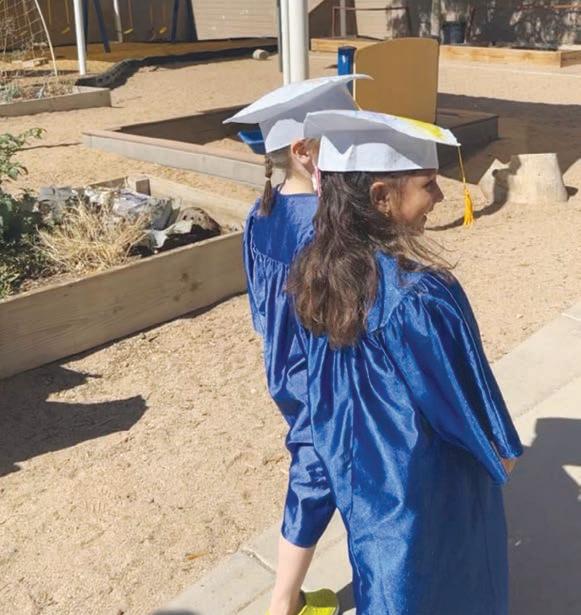
Expectant parents gather together to memorialize their participation in the Bureau of Jewish Education of Greater Phoenix’s Baby University.
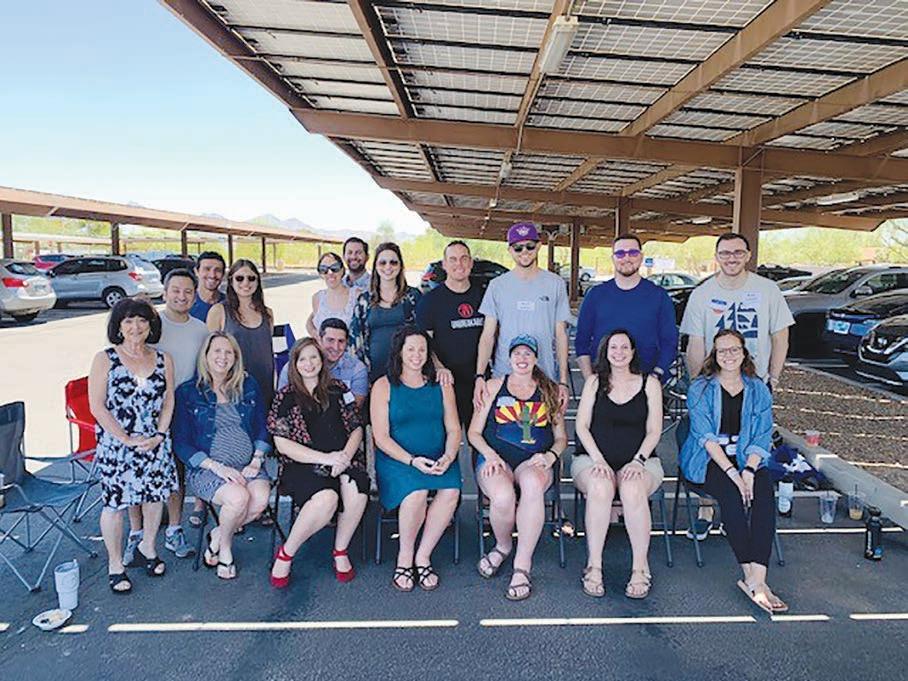

Phoenix chapter of the
National Committee
“The
This COMMUNITY page features photos of community members around the Valley and the world. Submit photos and details each week to editor@jewishaz.com by 10 a.m. Monday.

and finding only older women — she felt like she didn’t belong.
It’s hard to find potential new members, Tuckman said. She remembered that in years past, there were annual events where every Jewish organization could pass out information to many people at one time. Now it’s all word of mouth and the internet. Tuckman’s daughter created a Facebook page for the chapter and her son encouraged her to do the auction on Zoom rather than via email, which was her initial idea.

“I’m technologically hampered,” she said. “It makes it hard to get exposure.”
While her chapter “is hanging on by its teeth,” she said, she’s still optimistic that it probably has at least another 10 years. Many people like the educational aspect
BAT MITZVAH
ALIYA JAYE MELHADO
behind the group, and once in-person events can be held safely, she thinks the social aspect will keep the chapter going.

For now, she’s not making many demands on members’ time. She hopes to raise around $2,000 in June’s auction. In a normal year, the annual auction brings in around $4,000. “But considering it’s on Zoom, this year, $2,000 would be really good,” she said.
She’s excited to see everyone for the first time in more than a year, even though it will only be on a computer screen.
“We hope people will participate — the more the merrier,” she said. “We’re trying to keep together and we welcome anyone of any age to join us.” JN
For a complete list of auction items, email Ellen Tuckman at docdavid39@gmail.com.
Lori Beth Guttman, 63, passed away on January 23, 2021, at her home in Scottsdale. She was born on May 15, 1957 in Detroit.
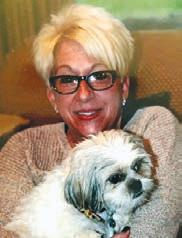
Lori was born and raised in Oak Park, Michigan and graduated from Oak Park High School. She met Jerry Guttman through a mutual friend and they married in October 1991. They relocated to Scottsdale in 1996. Lori was a beloved wife, mother, nana, daughter, sister and friend. She had a caring heart and love for all animals. Lori enjoyed travel. She loved to laugh and make others smile and feel special. Lori would help others and expect nothing in return. Lori’s greatest pleasure was to cook and have friends and family over for holiday dinners, but she especially treasured the time she spent with her family, friends and especially her grandchildren. She was loved and her snarky wit and wonderful sarcasm will be deeply missed. She will be forever in our hearts, and always our inspiration. We love you forever Lori.
Aliya Jaye Melhado becomes a bat mitzvah on June 5, 2021, at Congregation Kehillah. She is the daughter of Debbie and Marc Melhado of Phoenix. A student at Explorer Middle School, Aliya (Ally) enjoys art, writing and animation.

Shiloh Meir Balsam was born May 8, 2021. He is the son of Raina and Ezra Balsam of Scottsdale.
Grandparents are Robin and Charlie Meyerson of Scottsdale; and Gila and Avi Balsam of Los Angeles.
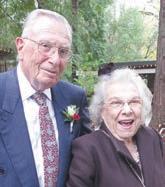
Shiloh has two siblings, Dvir, 2 and Noam, 1. JN
She is survived by her husband, Jerry L. Guttman; her sons, Adam Wasserman (Nicole), Jake Guttman (Melanie); her stepdaughter, Casey Elliott (Kurt); her four grandchildren, Ryker, Sadie, Levi and Davis; her mother, Eleanor Factor; her two brothers, David Factor (Deborah) and Gary Factor (Bobby); and numerous relatives and friends.

She was preceded in death by her father, Charles Factor. She is resting at Paradise Memorial Park in Scottsdale. Memorial contributions may be made in Lori’s name to the Arizona Humane Society. www.azhumane.org
With a heavy heart, we share the sad news that our mother, Marcia Ben-Ora, died of natural causes on Tuesday, May 11, which would have been our father’s 90th birthday.
Marcia was born and grew up in Minneapolis. She met our dad, Avi Ben-Ora, at the Hillel House while they were students at the University of Minnesota. They married in 1954 and were able to celebrate their anniversary in fine style for over 60 years. They spent 40 years in Phoenix and remembered those years fondly. Our mom loved her children, Eve, Dan and Miriam, but her six perfect grandchildren, Naomi, Carmi, Rebecca, Kelden, Fiona and Jeremy, could do no wrong. She welcomed her children’s spouses, Avi, Carolina and Cliff; and her grandchildren’s spouses, Ryan and Chaney, into the family with open arms. She was also happy to meet Rebecca’s boyfriend, Danny. Marcia is survived by her sister and brother-in-law, Lois Mirviss and Sy Johnson, who will remember her with love. A private funeral will take place. She will be buried next to our dad, who died four years ago, whom we still miss every day.
May her memory be a blessing to all who knew and loved her.











